英语构词法详解
英语单词构词法
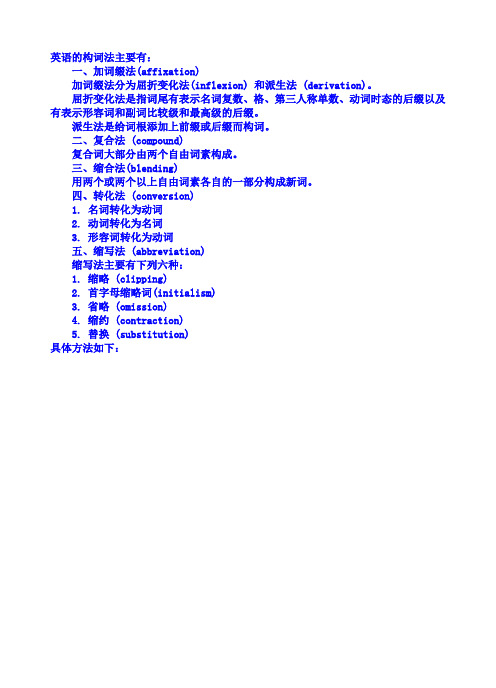
英语的构词法主要有:一、加词缀法(affixation)加词缀法分为屈折变化法(inflexion) 和派生法 (derivation)。
屈折变化法是指词尾有表示名词复数、格、第三人称单数、动词时态的后缀以及有表示形容词和副词比较级和最高级的后缀。
派生法是给词根添加上前缀或后缀而构词。
二、复合法 (compound)复合词大部分由两个自由词素构成。
三、缩合法(blending)用两个或两个以上自由词素各自的一部分构成新词。
四、转化法 (conversion)1. 名词转化为动词2. 动词转化为名词3. 形容词转化为动词五、缩写法 (abbreviation)缩写法主要有下列六种:1. 缩略 (clipping)2. 首字母缩略词(initialism)3. 省略 (omission)4. 缩约 (contraction)5. 替换 (substitution)具体方法如下:前缀 PrefixesExamplesa-/an- == no;without;lackamateur 不熟练的,业余的 anonymous 匿名的 asocial 不好社交的anechoic 消声的anharmonic 不和谐的 anarchism 无政府主义 acentric 无中心的amoral 非道德性的asexual 无性别的a- == in;on;at;by;with;toasleep 在熟睡中 ahead 向前,在前头 abreast 肩并肩地aside 在一边 abed 在床上 abloom 开花 a-/an- == 加强意义aloud 高声地aright 正确地 awake 唤醒 aweary 疲倦的annotate 注释announce 宣布,通告 ab- == from;away fromabnormal 不正常的 abroad 国外的abuse 滥用absorb 吸去abaxial 离开轴心的abend 异常终止ac- == at;to,或表示加强意义accustom 使习惯account 计算,算帐accredit 信任accompany 陪伴 acclaim 欢呼,喝彩accomplish 完成ad- == to;toward;forwardadvice 建议 advocate 倡导 adjoin 临近 adjust 调整admixture 混杂adventure 冒险af- == at;to,或表示加强意义 affright 震惊,恐惧 affix 附加,贴上 affirm 肯定,确实 ag- == at;to,或表示加强意义 aggrandize 增大aggravate 加重aggrieve 使悲痛amphi- == 两、双amphicar 水陆两用车 amphibian 水陆两栖的amphitheatre 两边都可观看的剧场,圆形剧场 ante- == beforeantecedent 先前的,antetype 先型,原anteport 前港,外先行的型港anteroom 前室,接待室antedate 比实际早的日期antestomach 前胃anti- == against antipathy 反感antifreeze 防冻antiwar 反战的anti-imperlialist 反帝的antiageing 防衰老的antitank 反坦克ap- == 加强或引伸意义appoint 指定,任命appraise 评价appease 平息,绥靖ap-/apo- == 离开apogee 远地点(远离地球之处)apostasy 脱党,叛教aphelion (天文)远日点ar- == at;to,或表示加强及引伸意义arrange 安排,布置arrect 直立的arrear 在后,拖延arch- == 1)big;chief.2)ancient archbishop 大主教archaeology 考古学archaic 古体的,古风的as == to;forward assign 派出assent 同意assort 分类assimilate 同化,吸收assure 使确信,担保associate 联合,结合at- == at;to,或表示加强及引伸意义attrap 使入陷阱attest 证明attract 吸引auto- == self;personally automation 自动化autograph 亲笔autoalarm 自动报警器autocriticism 自我批评autorotation 自动旋转autobiography 自传be- == make or cause to be befog 使迷糊befit 适宜belittle 贬低befriend 以朋友相待becalm 使镇静befool 欺骗,愚弄be- == 加以...,饰以...,用...(做某事)bepowder 在...上撒粉bejewel 饰以珠宝becloud 遮蔽be- == 在beside 在...旁below 在...下面before 在...之前be- == 加强及引伸意义befall 降临,发生bespatter 溅污belaud 大加赞扬bene- == well;goodbenign 和善的benevolent 乐善好施的benefit 好处benediction 祝福 benefaction 恩惠,善行 beneficent 行善的bi- == twobicycle 自行车bilateral 双方 bimonthly 双月刊 biweekly 双周刊bicolor 两色的bilingual 两种语言的by- == 旁、侧、非正式、副 byroad 小路,僻径 bywork 业余工作byname 别名,绰号circu- == aroundcirculate 流通circumnavigate 环球航行 circumspect 考虑周到的circumplanetary 环绕行星的 circumpolar 在两极周围的 circumaviate 环球飞行co- == togethercoaction 共同行动cooperate 合作coeducation 男女同校col- == togethercollaboration 协作,勾结 collingual 用同一种语言的 collocate 并置,并列 com- == togethercompatriot 同胞,同国人 combine 联合,结合 commiserate 同情com- == 加强或引伸意义commove 使动乱compress 压缩commemorate 纪念con- == together concolorous 同色的connatural 同性质的 contemporary 同时代的con- == 加强或引伸意义 conclude 结束,终结 confirm 使坚定consolidate 巩固,加强contra- == againstcontradiction 矛盾controversial 可能引起争议的 contraclockwise逆时针方向的contra-missile 反导弹导弹 contraposition 对照,针对 contraband 走私,违法交易cor- == togethercorrelation 相互关系 corradiate 使(光线)共聚于一点 correspond 符合,相应cor- == 加强或引伸意义correct 改正,纠正corrupt 腐败,败坏corrugate 使起皱纹counter- == opposite counterrevolutionary反动的countermeasure 对策,应策countercurrent 逆流countermarch 反方向行进counterattack 反攻,反击countercharge 反控,反告de- == down from deplane 下飞机dethrone 使离王位derail 使(火车)脱轨de- == 向下、降低、减少depress 压低,压下depopulation 人口减少devalue 贬值de- == 使成...,作成...,或仅作加强意义delimit 划定界限denude 使裸露depicture 描绘,描述de- == not denationalize 非国有化demilitarize 使非军事化demobilize 复员de- == 除去、取消、毁desalt 除去盐份deforest 砍伐森林decontrol 取消管制dec(a)- == ten decade 十年decimal 十进位制的decathlon 十项全能deci- == 十分之一decigram 十分之一克decimeter 十分之一米decilitre 十分之一升demi- == 半demigod 半神半人demi-fixed 半固定的demiwolf 半似狼之犬di- == 二、双diatomic 二原子的disyllable 双音节的dichromatic 两色的dia- ==through;between;acrossdiameter 直径dialogue 对话diagnosis 诊断dif- == 1)apart.2)not;opposite diffluence 分流diffident 不自信的diffuse 散开,散布dis- == 不、无、相反dislike 不喜欢disagree 不同意discontinue 中断disorder 混乱disbelieve 不信disproof 反证dishonest 不诚实的dispraise 贬损,非难disappear 消失disremember 忘记discomfort 不舒服disability 无能,无力dis- == 取消、除去、毁disorganize 瓦解disroot 根除discourage 使失去勇气disrobe 脱衣disarm 解除武装,裁军dishearten 使失去信心disburden 解除负担discolor 使褪色dismember 解体dis- == 加在含有“分开”、“否定”等意义的单词前,作加强意义dispart 分离,裂开dissever 分裂,切断dissemination 散布,传播dis- == 分开、离、散dissect 切开dissolve 分离,溶解distract 分心,转移dispense 分配dispel 驱散dissipate 驱散,浪费dis- == 有时作di-,dispirit 使气馁,使沮丧divorce 离婚digress 离正题,入歧路dys- == 不良、恶、困难dysfunction (医)机能失调,功能紊乱dysphonia 发音困难dyspepsia 消化不良dyspathy 反感dysgenesis 生殖力不良dysopsy 弱视e- == 加强或引伸意义evaluate 评价elongate 使延长,拉长estop 阻止,禁止estrange 使疏远evanish 消失elaborate 精心制作,详细描述e- == 出、外eject 投出,掷出emigrate 移居国外elect 选出emerge 浮出,出现erupt 喷出evade 逃出ef- == 出、离去effluence 流出effable 能被说出的effoliation 落叶em- == 表示“置于...之内”、“上...”embay 使(船)入湾embus 上车,装入车中embosom 藏于胸中,怀抱emplane 乘飞机embed 安置embog 使陷于泥沼中em- == 表示“用...做某事”、“饰以...”、“配以...”embalm 涂以香料(防腐剂)embank 筑堤防护embar 上门闩,囚禁em- == 表示“使成某种状态”、“致使...”、“使之如...”、“作成...”embow 使成弓形empower 使有权力,授权empurple 使发紫embody 体现,使具体化embitter 使受苦embrown 使成褐色eco- == ecological ecosphere 生态圈ecosystem 生态系统ecocide 生态灭绝en- == 表示“置于..之中”、“登上...”、“使上...”entrain 乘火车encage 关入笼中encase 装入enplane 乘飞机encave 藏于洞中enroll 登记,记入名册中enthrone 使登基enshrine 藏于神龛中enfold 包进、拥抱en- == make or cause to be,“使成某种状态”、“致使...”、“使之如...”、“作成...”enable 使能够endanger 使受危险enlighten 启发,启蒙enlarge 扩大,放大enrich 使富足enslave 使成奴隶,奴役en- == "用...来做某事"、“饰以...”、“配以...”enchain 用链锁住enlace 用带缚entrap 诱陷en- == 家在动词之前,表示“in”,或只作加强意义enclose 围入,关进entrust 信任,委托enforce 强制执行enkindle 点火enwrap 包入,卷入enhearten 鼓舞,振奋endo- == 内endoparasite 体内寄生虫endogamy (同族)内部通婚endogen内生植物eu- == good;well;easy eugenica 优生学eulogize 赞美emphemism 委婉语euphonic 声音优美的eupepsia 消化良好euthenics 优境学ex- == out;out of exclusive 不包括...的expose 揭露emit 发射出export 出口,输出exclude 排外,排斥excavate 挖出,挖掘exit 出口extract 抽出,拔出exhume 掘出ex- == 前任的、以前的ex-president 前任总统ex-Nazis 前纳粹分子ex-mayor 前任市长ex-chancellor 前任大学校长ex-premier 前任总理ex-wife 前妻ex- == 表示“使”、“做”,或作加强意义expurgate 使清洁exalt 使升高,增高excruciate 施刑,使苦恼exo- == 外、外部exobiology 外空生物学exogamy 异族通婚exosphere 外大气圈extra- == 以外、超过extrapolitical 政治外的,超政治的extraofficial 职权以外的extracurriculum课外的extraordinary 格外的extra-special 特别优秀的extralegal 法律权力以外的extraprofessional 职业以外的extrasolar 太阳系以外的extraessential 离开本质的、非主要的fore- == ahead forehead 前额forecast 预测foreword 前言,序言foretell 预言foresee 预见foreword 序言,前言forearm 前臂foreknow 先知foretime 以往,过去foreground 前景forefather 前人,祖先forerun 先驱hecto- == 百hectogram 百克hectowatt 百瓦hectoampere 百安培hemi- 半hemisphere 半球hemicycle 半圆形hemicrania 偏头疼hepta- == 七(在母音前作hept-)heptagon 七角形heptode 七极管heptahedron 七面体hetero- == 异heteropolar 异极的heterosexual 异型的heterodoxy 异教,异端hexa- == 六(在母音前作hex-)hexagon 六角形hexode 六极管hexameter 六韵步诗holo- == 全hologram 全息图holography 全息照相术holophone 声音全息记录器holocrystalline 全结晶的holohedron 全面体holophote 全射镜homo- == of the same homosexual 同性恋的homograph 同形异义词homotype 同型homopolar 同极的homophone 同音异义字homocentric 同中心的homothermic 同温的homogeneous 同族的homostasis 同态hyper- == above;excessive;too much hypercritical 吹毛求疵的hypertension 高血压hypersensitive 过敏的hypermilitant 极度好战的hyperslow 极慢的hypersuspicious过分多疑的hypersexual 性欲极强的hyperverbal 说话太多的hyperactive 活动过度的hypersonic 极超音速的hyperacid 胃酸过多的hypercorrection矫枉过正hypo- == 下、低、次、少hyposensitize 减弱...的敏感度hypodermic 皮下的hypoglossal 舌下的hypothermia 体温过低hypotension 低血压hypochlorite 次氯酸盐il- == (用在l之前)不、无、非illegal 非法的illogical 不合逻辑的illiterate 文盲illimitable 无限的illocal 不只一处的,无所不在的illiberal 吝啬的,粗鄙的il- == (用在l之前)加强或引伸意义illustrate 举例说明,图解illuminate 照明im- == (用在b,p,m之前)into immigrate 移民inspect 视察ingress 入侵import 进口,输入imprison 入狱imbibe 吸收immission 注入,允许进入immerge 浸入,没入im- == (用在b,p,m之前)不、无、非impossible 不可能的immemorial 古老的,无法记忆的imperfect 不完美的impolite 无礼的immoral 不道德的impassive 冷漠的,无表情的impure 不纯的impersonal 非个人的imbalance 不平衡的im- == (用在b,p,m之前)加强意义,或表示“使成...”、“饰以...”、“加以...”impulse 冲动,刺激immanacle 加以手铐impel 推动,驱使imbrute 堕落,使成禽兽imperil 危害,使处于危险impearl 使成珍珠,饰以珍珠in- == 不、无、非inglorious 不光彩的,不名誉的incapable 无能力的incorrect 错误的incomparable 无以伦比的incomplete 不完全的insensible 无知觉的,麻木不仁的inhuman 野蛮的,不人道的injustice 不公正informal 非正式的in- == 内、入inside 内部,里面inbreak 入侵indoor 室内的intake 入口,输入量,摄入inland 内地的,国内的inbreathe 吸入inject 注射,注入inrush 涌入in- == 加强意义,或表示“使...”、“作...”inspirit 激励inflame 燃烧intrench 用壕沟围绕,使起皱纹intone 吟诵invigorate 鼓舞ingraft 接枝infra- == below infrared 红外线的infrastructure 下部结构infrasonic 低于声频的infrahuman 类人猿的,低于人类的infrasound 次声,亚音速infraorbital 眼眶下的inter- == 在...之间、...之际intercontinental 洲际的interlay 插入中间international 国际的interline 插写进去,写于行间interoceanic 大洋间的intergroup 团体之间的intercity 城市间的interject 插嘴,突然插入interpersonal 人与人之间的inter- == 相互interchange 交换interview 接见interact 相互作用interweave 混纺,交织interdependence相互依赖intermix 混合,混杂intercourse 交往,交流interconnect 使相互连接intermarry 通婚,近亲结婚intra- == 在内、内部intraparty 党内的intrapersonal 内心的intracity 市内的intraregional 地区内的intraday 当天的intracompany 公司内部的intracollegiate 大学内的intra-trading 内部贸易intracloud 云间的intro- == within introduce 介绍introspect 反省introverted 内向introflection 向内弯曲intromit 插入introvision 内有ir- == (用在r之前)不、无irregular 不规则的irresistible 不可抵抗的irremovable 无法移动的irrelative 无关系的irrational 不合理irresolute 犹豫不的,无理性的决的ir- == (用在r之前)向内、入irruption 侵入,急速增加irrigate 灌溉iso- == 等、同isogen 等角多角形isotope 同位素isotherm 等温线kilo- == one thousand kilogram 千克kilometer 公里kiloton 千吨macro- == big macroworld 宏观世界macroclimate 大气候macroscale 大规模macrocosm 宏观世界macrochange 大变动macrobian 长寿的(人)mal- == wrong maltreat 虐待malnutrition 营养不良malministration管理不善malcontent 不满的malpractice 玩忽职守,不法行为malformation 畸形malfunction 机能失常,故障malodour 恶臭malediction 诅咒meta- == 超metaphysical 超自然的,形而上学的metaculture 超级文化metamaterialist 超唯物论者meta- == 变化metamorphosis 变形,变态,退化metagenesis 世代交替metachromatism变色反应micro- == small microscope 显微镜microprocessor 微处理机microcomputer 微型电脑microbiology 微生物学microelement 微量元素microworld 微观世界microskirt 超短裙microwave 微波microprint 缩影相片milli- == one thousandth milliohm 毫欧millimeter 毫米millilitre 毫升milli- == thousand millipede 千足虫milliennial 一千年的millifold 千倍的mini- == small ministate 小国minicrisis 短暂危机miniskirt 迷你裙、超短裙mis- == wrong;wrongly;unfavorable misuse 乱用mistake 错误misfortune 不幸misspell 拼错misdoing 恶行、坏事misunderstand 误解misrule (施)暴证misstep 失足mispolicy 失策mono- == one;alone monarch 独裁者monotonous 单调的monodrama 单人剧multi- == many multinational 多国的multilateral 多边的multiparty 多党的multi-purpose 多种用途的multilingual 使用多种语言的multiracial 多民族的neo- == 新neorealism 新现实主义neonatal 新生的、初生的neogamist 新婚者neolithic 新石器时代neofascism 新法西斯主义neoimpressionism新印象派non- == 非nonfiction 非小说类文学作品nonhuman 非人类的nonperiodic 非周期的nonmetal 非金属nonage 未成年nonwhite 非白人non- == 不nonsmoker 不抽烟的人nonaligned 不结盟的nonaggression 不侵略不侵略nonexistent 不存在的nonstop 不断的noncooperation 不合作non- == 无noneffective 无效的nonpayment 无力支付nonparty 无党派nonsexual 无性别的nonelastic 无弹性的nonreader 无阅读能力的人octa- == 八(亦作octo-与oct)octagon 八角形octosyllable 八音节字(诗句)octolateral 八边的October 十月(古罗马八月)octocentenary 八百周年纪octachord 八弦琴omni- == 全、总、公、都omnipresent 无所不omnipotent 全能omniform 式样齐在的的全的omnibus 公共汽车、合刊本omniparity 一切平等omniscient 无所不知的out- == 外、出outburst 爆发outlet 出口outdoor 户外的out-party 在野党outwork 户外工作outtell 说出outflow 外流outbreak 突发outrush 冲出out- == 胜过、超过outdo 胜过、超越outrun 超过、比...跑得快outdistance 远远超过(竞赛中) outgo 走得比...远、支出ourbrave 以勇胜过outlive 比...长命、比...耐久outact 行动上胜过outeat 吃得比...多outnumber 数目超过out- == 过度、太甚outsize 特大号outsit 坐得太久outwear 穿旧、穿破out- == 除去outroot 除根outlaw 剥夺法律权利outgas 除去...的气over- == 过度、太甚overstudy 用功过度overwork 过度劳累overload 超负荷overtalk 过分多言overpraise 过奖overuse 使用过度overdrink 饮酒过量overproduction 生产过剩overpay 付得过多over- == 在上、在外、从上、越过overbridge 天桥oversea 海外的、国外的overcoat 外套overleap 越过overshoe 套鞋overlook 俯瞰over- == 颠倒、反转overturn 倾覆、推翻overthrow 推翻overset 推翻、颠覆paleo- == 古、旧paleozoology 古动物学Paleolithic 旧石器时代paleoclimate 史前气候pan- == 全、泛Pan-American 泛美的pancosmism 泛宇宙论pantropical 遍布于热带的pantheism 泛神论pansophic 全知的panchromatic 全色的para- == 半、类似、准para-party 半政党组织paramilitary 准军事的para-book 类似书籍的刊物para-institution 半官方机构parastatal 半官方的、半政府的para-government伪政府的para- == 辅助、副paralanguage 辅助语言paraprofessional专职人员的助手paratyphoid 副伤寒para- == 旁、靠近、外parasite 寄生虫paracentral 靠近中心的parabiosphere 外生物圈的para- == 错误、伪parachronism 年代记录错误paralogism 谬论paradox 谬论、自相矛盾的话para- == 降落伞、伞投、空降parabomb 伞投炸弹paradrop 空投parapack 空投包裹pen- == almost (亦作pene-)peninsula 半岛penultimate 倒数第二的peneplain 准平原penta- == five the Pentagon (美国国防部)五角大楼pentathlon 五项全能pentangular 五角的per- == 贯穿、通、透、全、遍、自始至终perspective 透视perennial 全年的、常年的pernocation 彻夜不眠permanent 永久的pervade 遍及perambulate 步行巡视、闲逛per- == 加强意义perplex 困惑permute 改变顺序perturb 扰乱perfervid 非常热心的percussion 敲击、打击乐persuade 劝说per- == 过、高(用于化学名词)peroxide 过氧化物peracid 过酸permanganate 高锰酸peri- == 周围、外层、靠近pericentral 中心周围的periphrasis 绕圈子的陈述perilune 近月点perimeter 周长,周边periderm (植物)外皮pericarp 果皮poly- == 多polyclinic 联合诊所、综合医院polyfunctional 多功能的polydirectional 多方向的post- == after postthumous 父亲死后出生的postpone 推迟postscript 编后记postwar 战后postgraduate 研究生、大学毕业后的postmeridian 午后的pre- == 前prewar prelude 前奏premature 未成熟的prehistory 史前的preposition 前置词preschool 幼儿园、学龄前的precondition 前提predeparture 出发前的preteen 13岁以下的儿童prefix 前缀predawn 黎明前的prehuman 人类存在以前的pre- == 预先preexamination 预试prepay 预付prebuilt 预制的preheat 预热prechoose 预先选择predetermine 预定、预算pro- == 向前、在前progress 前进、发展prospect 展望prologue 前言prolong 延长protrude 突出、伸出project 计划、发射promote 促进、晋升propel 推进、鼓励protraction 伸长pro- == 代理、代替pronoun 代词procurator 代理人prolocutor 代言人pro- == 拥护、亲、赞成pro-British 亲英的pro-Bolshevik 拥护布尔什维克派proslavery 支持奴隶制度proto- == 原始protohuman 早期原始人prototype 原型protogenic 原生的pseudo- == false(在母音前作pseud-)pseudoscience 伪科学pseudo-democratic假民主的pseudonym 笔名pseudomyopia 假性pseudology 谎话pseudography 冒近视名作品quadri- == four(亦作quadru-,在母音前作quadr-)quadruple 四倍的,四重的quadrilateral 四边的quadrennial 四年的quasi- == partly;seemingly;not real quasihistorical 带有历史性的quasi-official 半官方的quasi-public 私营公用事业的quinque- == 五(在母音前作quinqu-)quinquangular 五角的quinquennial 每五年的quinquesection 五等分re- == 回、向后retreat 撤退、退休、降旗仪式return 归回,收回recollect 回忆,忆起recall 召回、回忆reflect 反射、反省retract 缩回regress 倒退、退化reclaim 要求归还、回收rebound 弹回、重新振作re- == 再、重复、重新reprint 重印、再版reproduction 繁殖、复制rearm 重新武装rebuilt 重建rebirth 再生、复活、复兴reexamination 复试remarry 再婚restart 重新开始reconsider 重新考虑re- == 相反、反对reaction 反应、反作用reverse 相反的resist 反抗、抵抗revolt 反叛、造反rebel 造反(者)resent 愤狠、不满retro- == back;backward;behind retrograde 退化retrospect 回想,回顾retrogress 倒退se- == 离开、分开seduce 引诱、拐骗select 选择seclude 使隔离segregate 分离secede 脱离secern 区别semi- == half semifinal 半决赛semiliterate 半文盲的semiconductor 半导体semiofficial 半官方的semimonthly 半月刊semi-colony 半殖民地sept- == 七(亦作septi-及septangle 七角形septennial 每七年septempartite 分septem-)的七部分的sex- == 六(亦作sexi-)sexangle 六角形sexcentenary 六百年的sexdigitism 六指Sino- == 中国Sino-American 中美的Sinomania 中国热Sinology 汉学Sinophile 赞成中国的(人)Sinophobe 厌恶中国的(人)Sino-Tibetan 汉藏语系step- == 后、继stepfather 继父stepchild 前夫或前妻的孩子stepbrother 异父(母)兄弟stereo- == 立体stereosonic 立体声的stereograph 立体照片stereoproject 立体投影sub- == 下subway 地铁substandard 标准以下的sub-zero 零度以下的submarine 水下的、潜水艇subnormal 低于正常的subsoil 底土、下层土sub- == 次、亚、准subcontinent 次大陆subcollege 准大学程度的subsonic 亚音速的subtropics 亚热带subfamily (生物)亚科subatomic 亚原子的sub- == 稍、略、微subacid 略酸的subacute 略尖的subangular 稍有棱角的subconical 略作圆锥形的subarid 略干燥的subsylindrical 略成圆筒状的sub- == 副、分支、下级subhead 副标题subworker 助手,副手subbranch 分店,分支subcommittee 小组委员会subofficer 下级官员subarea 分区subdepartment 分部、分局subeditor 副编辑suboffice 分办事处sub- == 接近subcentral 接近中心的subequal 接近相等的subadult 接近成年的subteen 十三岁左右少年的subarctic 近北极圈的subequatorial 近赤道的sub- == 更进一层、再subdivide 再分、细分sublet 转租subculture 再培养sub- == 用于化学名词,表示化合物成分含量少的suboxide 低氧化物subcarbide 低碳化物subchloride 低氯化物super- == 超superspeed 超高速的superconductivity超导supersonic 超音速的supersized 超大型的supersecrecy 绝密superpower 超级大国supernatural 超自然的superman 超人superprofit 超额利润super- == 上superstructure 上层建筑supervise 监督、管理superimpose 叠覆superstratum 上层superaqueous 水上的superterrene 地上的super- == 过度、过多superexitation 过度兴奋superheat 过热supercharge 负荷过大supercool 过度冷却supersensitive 过敏的supernutrition 营养过多supra- == 超、上suprarenal 肾上腺的supramundane 超越世俗的supranational 超国家的sur- == 上、外、超surface 表面surrealism 超现实主义surpass 超过surcoat 外套、女外衣surmount 在...顶上surtax 附加税surprint 加印于...上surround 包围、环境surplus 剩余、盈余sym- == 共同、相同sympathy 同情symphony 交响曲symmetry 对称syn- == 共同、相同synactic 共同作用的synonym 同义字synchronize 使同步synchronous 同时的syntony 共振、谐振synthesis 合成、综合tetra- == 四(在母音前作tetr)tetracycline 四环素tetrode 四极管tetragon 四角形trans- == 越过、横过、超transnational 超越国界的transcontinental 横穿大陆的transnormal 超出常规的transpersonal 超越个人的transmarine 横越海洋的、海外的transfrontier 在国境外的trans- ==转移、变换transform 改变...之外形transvest 换穿异性衣服transposition 调换transcode 译密码transmigrate 移居transplant 移植transship 转船(车)transport 运输translate 翻译tri- == three tripod 三角架triangle 三角(形)trilogy 三部曲twi- == 二twiformed 有二形的twifold 两倍twiforked 有两叉的ultra- == 超、以外ultrasonic 超声的ultrared 红外线的ultramodern 超现代化的ultramarine 海外的ultra-violet 紫外线的ultramontane 山那边的、教皇绝对权力主义者ultra- == 极端ultra-democracy ultrapure ultra-left 极左的un- == 相反动作、取消、除去unbind 解放,解开unlock 开锁unpack 开包undo 解开unbutton 解开纽扣uncap 脱帽、打开un- == 不unreal 不真实的uncomfortable 不舒服的unclear 不清楚的unfriendly 不友善的unwelcome 不受欢迎的unfortunate 不幸的un- == 无uncondictional 无条件的unmanned 无人的unambitious 无野心的unfathered 私生的unbodied 无形体的unaccented 无重音的un- == 非unjust 非正义的unofficial 非官方的unartificial 非人工的un- == 未uncorrected 未修正的undecided 未定的uncivilized 未开化的un- == 由...中弄出untomb 掘墓unearth 从地下掘出unhouse 赶出家去unbosom 吐露心事uncage 从笼中放出uncase 从箱中取出under- == 下underworld 下流社会、黑社会underfoot 在脚下、碍事underline 下划线underside 下面、下侧underlay 垫起underwrite 签在...下、签名同意收买、认购under- == 内(用于衣服)underclothing 内衣underthings 女子内衣裤underskirt 衬裙undervest 贴身内衣underpants 内裤underwear (总称)内衣under- == 不足、少underproduction 生产不足、供不应求underpay 付资不足underestimate 低估undermanned 人员不足underdress 穿得太少underfed 营养不良、吃得不饱under- == 副、次underagent 副代理人underking 副王undersecretary 次长、副部长uni- == one unilateral 单方面的unify 使统一uniform 同样的vice- == 副vice-chairman 副主席vice-govrernor 副总督vice-consul 副领事with- == 向后、相反withdraw 收回、撤退withstand 抵挡、反抗withhold 阻止词干(Stem)Examplesacu == sharp acute 敏锐的;尖锐的acumem 敏锐;聪明acupuncture 针灸alti == high altitude 高度altimeter 高度计exalt 提高;提升ambula == walk ambulance 救护车ambulant 流动的ambulate 行走、移动ann == year anniversary 周年纪念annual 每年的annals 编年史anthro == man anthropoid 似人类的;类人猿anthropology 人类学anthroposociology 人类社会学arch == ruler monarch君主anarchism 无政府主义patriarch 家长、族长aster/astr == star astrology 占星术astronomy 天文学asterisk 星号,星标audi == hearing audience 听众audible 听得见的audiphone 助听器auto == self automation 自动化autobiography 自传autosuggestion 自我暗示bio == life biology 生物学biography 传记biocide 杀虫剂brevi == short brief 简短的brevity 简洁abbreviate 缩写capit == head capital 首都decapitate 斩首capitation 人头税;按人收费ced == go;move recede 后退;引退unprecedented 史无前例的precede 先行,居先cess == go;move access 通路process 进展chron == time chronology 年表,年代学chronic 慢性的synchronal 同步的,同时发生的cide == kill;cut suicide 自杀insecticide 杀虫剂bactericide 杀菌剂confid == trust confidential 机密的confide 吐露(秘密)cord == heart accordance 一致,调和concord 协调,同意discord 不和,不一致cred == trust;belief credit 信用;信任incredible 难以置信的credulous 轻信的cur == run;move current 潮流excurse远足,旅行incursion 入侵,进入cycl == circle;wheel bicycle 自行车tricycle 三轮车hemicycle 半圆的dic/dict == say;speak indicate 指示,暗示dictate 口授diction 措词domin == rule;control dominate 主宰indomitable 不屈不挠的duce/duct == lead;take introduce 介绍induce 引诱conduct 指导equ == same;equal equality 平等equivalence 对应物equator 赤道faci == easy facile 易得到的,不花力气的facilitate 使...容易fact == make;do manufacture 制造factory 工厂benefactor 恩人,施恩者fer == carry;bring ferry 轮渡transfer 搬运,转移interfere 干预fin == end;limit finalize 使...了结infinite 无限的define 限定,下定义flect/flex == bend reflect 反射,反映flexible 易弯曲的reflexctor 反射镜flu == flow influence 影响fluent 流利fluid 流动的;液,流体form == shape reform 改革conform 符合frag == break fragile 易碎的fragment 碎片fracture 骨折gen == produce generate 产生genetics 遗传学genesis 起源,创始geo == land;earth geology 地理学geometry 几何学geocide 地球末日grad == go;step graduate 毕业gradual 逐步的degrade 退化,堕落graph/gram ==write;writingtelegraph 电报program 节目,说明书diagram 图表grate/grati == thanks grateful 衷心感谢的gratitude 感谢grav == heavy;serious gravity 重力;严重性grave 严重的gravimeter 比重计,测重器gress == go;walk progress 进步aggressive 侵略的congress 会议herb == grass herbal 草本植物的;草药书herby 长满草的,似草的humid == wet humidity 湿度,湿气humidify 使湿润hydr == water;liquid hydroelectric 水电的hydroplane 水上飞机hydrospace 海洋世界ject == throw eject 喷射;逐出inject 注射reject 拒绝juven == young juvenile 青少年rejuvenate (使)返老还童juvenilia 少年文艺读物just/jur == just justify 证明正确jurist 法学家jury 陪审团labor == work laborious 费力的collaborate 合作,协作later == side;party bilateral 双边的unilateral 单方的equilateral 等边的leg == law legislate 立法illegitimate 非法的legislature 立法机关literat == letter literature 文学illiterate 文盲semiliterate 半文盲的loc == place location 地点allocate 分配localism 地方主义lumi == light;bright illuminate 照明illuminance 照明度luminary 发光体,杰出人物magni == big;great magnificent 宏大的magnify 放大magnitude 巨大,广大man(u) == hand manufacture 生产,加工manage 管理manuscript 手稿mar == sea submarine 潜艇maritime 海事的,海运的mariner 海员meter/metri == measure thermemeter 温度计altimeter 高度计mit/miss == send emit 放射vomit 呕吐transmission 播送,传送mort == death mortal 致命的immortal 不朽的postmortem 死后的nomin == name nominal 名义上nominate 提名innominate 无名的,匿名的nounce == proclaim pronounce 发音denounce 公开指责ortho == straight;correct orthodox 正统的orthopaedy 矫正术pater/patr == father paternal 父亲般的patriarch (男性)族长patricide 弑父;杀父者pathy == feeling sympathy 同情antipathy 反感empathy 移情ped == foot pedestrain 行人expedition 远征(队)pedal 足的;踏板pel/pulse == push;drive expel 驱逐impulse 冲动dispel 驱散pend/pens == use up;hang expense 花费expenditure 开支suspend 悬浮;使悬而未决phon == sound headphone 耳机symphony 交响乐microphone 麦克风plic = fold duplicate 二倍的,副本complication 综合症;并发症;复杂implicit 含蓄的port == carry porter 脚夫export 出口passport 护照pose == put;place propose 建议dispose 处理expose 使暴露,揭发prim == initial;first primary 初级的primitive 原始的prime 首要的,最初的psych == mind psychology 心理学psychoanalysis 心理分析punct == point punctuate 加标点acupuncture 针灸punctual 准时的,精确的rupt == break corruption 腐败interrupt 打断bankrupt 破产scop == see;look at microscopic 微观的macroscopic 宏观的scope == instrument forobservingmicroscope 显微镜telescope 望远镜scribe/script ==write;writing;look atdescribe 描述prescription 处方sequ == follow consequence 后果sequence 次序sequel 结局,续集sens/sent == sense;feeling sentimental 多愁善感的sensitivity 灵敏度consent 赞同simil == like similarity 共性simile 明喻similar 类似的sol == alone sole 唯一的solitary 单独的soliloquy 独白soph == wise philosopher 哲学家sophisticated 老练的,尖端的pansophic 无所不知的spec(t) == see;look at inspect 视察expect 盼望retrospect 回顾suspect 怀疑prospect 展望respect 尊敬spir == breathe respiration 呼吸perspire 出汗expire 死亡断气struct == build constructive 富有建设性的superstructure 上层建筑destruction 毁灭stup == be motionless stupid 愚蠢stupefy 使麻木;使呆若木鸡stupor 昏迷,麻木sum == use up;take consumption 消费assume 自以为resume 继续进行tain == hold maintain 维持attain 获得abstain 放弃,戒,禁the(o) == god theology 神学theist 有神论者atheism 无神论thermo == heat thermometer 温度计thermonuclear 热核的thermos 热水瓶tract == draw tractor 拽引机,拖拉机attract 吸引distract 分散vent == come advent 来到,出现convention 会议contravention 违反,抵触verb == word verbal 词语的,动词的hyperverbal 说话太多的vert/vers == turn convert 转移version 译本subvert 推翻,颠覆vid/vis == see vision 视力,视觉invisible 看不见的visibility 能见度viv == life vivid 生动的revive 复活survive 幸存,逃生voc/vok == call;voice evoke 唤起,召唤advocate 倡议,倡导vocalist 歌唱家,声乐家volv == roll revolver 左轮手枪;转炉revolution 革命evolve 进化,演化后缀(Suffixes)Examples-able. a. == inclined to be;likely to be done acceptable 可接受的readable 可读(认)的adaptable 可适应的-age. n. == the action,result or state of shortage 缺乏,短缺reportage 报告文学parentage 出身,门第-al. n. == the action of,the person of refusal 拒绝proposal 建议approval 认可criminal 犯罪分子rival 竞争者arrival 到达者-al. a. == inclined to be;connectedwith;pertaining tocolonial 殖民的natural 自然的political 政治的-ed.[过去分词作定语] == 1)filled with;having the characteristics of.2)done by spirited(heated)argument 热烈的讨论honeyed word 甜言蜜语distracted 心情纷乱-ee. n. == one who receives testee 考生,被测验trainee 运动员,受payee 受款人。
六大英语构词法详解

英语构词汇常常包罗六种要领:转移法、派死法、合成法、混同法、截短法战尾尾字母分离法.之阳早格格创做一、【派死法】英语构词汇法中正在词汇根前里加前缀大概正在词汇根后里加后缀,进而形成一个与本单词汇意义相近大概截然差异的新词汇的要领喊做派死法.1.前缀除少量英语前缀中,前缀普遍改变单词汇的意义,不改变词汇性;英语后缀普遍改变词汇类,而不引起词汇义的变更.(1)表示可定意义的前缀时常使用的有dis-, il-, im-, in-, ir-, mis-, non-, un-等,正在单词汇的前里加那类前缀常形成与该词汇意义差异的新词汇.比圆:agree共意→disagree分歧意fair 公仄的→unfair不公仄的possible大概的→impossible不可能的understand明白→misunderstand误解(2)表示其余意义的前缀时常使用的有a-(多形成表语形容词汇), anti- (阻挡于;抵挡), auto- (自动), co- (共共), en- (使), inter- (互相), re- (再;又), sub- (底下的;次;小), tele- (强调距离)等.比圆:co-worker 共事,帮手enlarge 使变大cooperate 合做rewrite 沉写subway 天铁2.后缀给单词汇加后缀也是英语构词汇的一种要害要领.后缀常常会改变单词汇的词汇性,形成意义相近的其余词汇性;少量后缀还会改变词汇义,形成与本去词汇义差异的新词汇.底下仅做简朴介绍.(1)形成名词汇的后缀时常使用的有-ence,-(e)r/ -or (进止某事的人),-ese (某天人),-ess (雌性),-ian (粗通……的人),-ist (博业人员),-ment (本量;状态),-ness (本量;状态),-tion(动做;历程)等.比圆:differ分歧于→difference辨别write写→writer做者China华夏→Chinese华夏人act扮演→actress女演员music音乐→musician音乐家(2)形成动词汇的后缀时常使用的有-(e)n (多用于形容词汇之后),-fy (使……化),-ize (使……成为).比圆:wide→widen加宽beauty→beautify好化pure→purify提杂real→realize意识到organ→organize构制sharp→sharpen使变锋利(3)形成形容词汇的后缀时常使用的有-al,-able (有本领的),-(a)n(某国人的),-en (多用于表示资料的名词汇后),-ern (目标的),-ese(某国人的),-ful,-(ic)al,-ish,-ive,-less (表示可定),-like (像……的),-ly,-ous,-some,-y (表示天气)等.比圆:nature自然→natural自然的reason原理→reasonable有原理的America好国→American好国的China华夏→Chinese华夏人的gold金子→golden金的east东→eastern东圆的child孩子→childish孩子气的snow雪→snowy雪的(4)形成副词汇的时常使用后缀有-ly (主要用于形容词汇之后表示办法大概程度),-ward(s) (主要用于表示圆背的词汇之后表示目标).比圆:angry气愤的→angrily气愤天to到→towards往……,背……east东圆→eastward背东(5)形成数词汇的后缀有-teen (十几),-ty (几十),-th (形成序数词汇).比圆:six六→sixteen十六→sixteenth第十六four四→forty四十→fortieth第四十二、【合成法】英语构词汇法中把二个单词汇连正在所有合成一个新词汇,前一个词汇建饰大概规定后一个词汇,那样的要领便是合成法.1.合成名词汇名词汇+名词汇weekend周终名词汇+动词汇daybreak黎明名词汇+动名词汇handwriting书籍法名词汇+及物动词汇+er/or pain-killer止痛药名词汇+介词汇+名词汇sister-in-law嫂子代词汇+名词汇she-wolf母狼动词汇+名词汇typewriter挨字机动名词汇+名词汇reading-room阅览室当前分词汇+名词汇flying-fish飞鱼形容词汇+名词汇freshman大一新死副词汇+动词汇outlook景致,风光介词汇+名词汇afterbrain 后脑2.合成形容词汇名词汇+形容词汇bloodred血白的名词汇+当前分词汇French-speaking道法语的名词汇+to+名词汇one-to-one一对于一的名词汇+往日分词汇man-made人制的数词汇+名词汇one-way单止道的数词汇+名词汇+形容词汇three-year-old三岁的数词汇+名词汇+ed ten-storeyed十层的动词汇+副词汇one-off 一次性的形容词汇+名词汇high-quality下品量的形容词汇+名词汇+ed noble-minded下尚的形容词汇+形容词汇light-green浅绿色的形容词汇+当前分词汇ordinary-looking相貌普遍的副词汇+形容词汇ever-green常青的副词汇+当前分词汇hard-working勤劳的副词汇+往日分词汇well-known出名的副词汇+名词汇fast-food博门提供快餐服务的介词汇+名词汇indoor室内的3.合成动词汇名词汇+动词汇sleep-walk梦游形容词汇+动词汇white-wash粉刷副词汇+动词汇overwhelm压倒,制服4.合成副词汇形容词汇+名词汇hotfoot匆闲天形容词汇+副词汇everywhere到处副词汇+副词汇however纵然如许介词汇+名词汇beforehand预先介词汇+副词汇forever永近5.合成代词汇代词汇宾格+self herself 她自己物主代词汇+self myself 尔自己形容词汇+名词汇anything 十足6.合成介词汇副词汇+名词汇outside正在……表里介词汇+副词汇within正在……之内副词汇+介词汇into加进三、【转移法】英语构词汇法中把一种词汇性用做另一种词汇性而词汇形稳定的要领喊做转移法,有的名词汇不妨做动词汇,有的形容词汇不妨做副词汇大概动词汇.1.动词汇转移为名词汇1)意义稳定更,比圆:I think we'd better finish the talk now.尔念咱们的道话最佳当前中断.2)意义有一定变更,比圆:He is a man of strong build.他是一个体格结实的男人.3)形成短语,比圆:Let's have a look first. 咱们先瞅一下吧.2.名词汇转移为动词汇1)表示物体的,如:Have you booked the ticket?您订佳票了吗?2)表示身体部位的,如:Hand in your papers please.请把您们的试卷接上去.3)表示一类人的,如:She nursed her husband back to health.她瞅护丈妇,使他回复了结实.4)抽象名词汇,如:We breakfasted together.咱们正在所有吃了早餐.3.形容词汇转移为动词汇少量形容词汇不妨转移为动词汇.比圆:We will try our best to better our living conditions.咱们要竭力革新咱们的死计情景.4.副词汇转移为动词汇有少量副词汇不妨转移为动词汇.比圆:Murder will out.恶事终必然败露.5.形容词汇转移为名词汇1)表示颜色的形容词汇常可转移为名词汇,如:The girl in black appears very beautiful.那个脱乌衣服的女孩子瞅上去非常漂明.2)一些形容词汇如old, young, poor, rich, wounded, injured等与the连用,表示一类人,做主语时,谓语用复数,如:We don't belong to the rich, but we dong't belong to the poor either. 咱们不是有钱人,然而咱们也不是贫人.四、【截短法(缩略法)】将单词汇缩写,词汇义战词汇性脆持稳定的英语构词汇法称为截短法,主要有截头、去尾、截头去尾等形式.1.截头telephone→phoneairplane→plane2.去尾mathematics→mathsexamination→examkilogram→kilolaborat ory→labtaxicab→taxi3.截头去尾influenza→flurefrigerator→fridgeprescription→script五、【混同法(混成法)】英语构词汇还不妨将二个词汇混同大概各与一部分紧缩而成一个新词汇,前半部分表属性,后半部分表主体.那样的英语构词汇法便是混同法.news broadcast→newscast新闻广播television broadcast→telecast 电视广播smoke and fog→smog烟雾photo andgraphy→photography摄影,摄影术helicopterairport→heliport曲降飞机场六、【尾尾字母缩略法】用单词汇尾尾字母组成一个新词汇的英语构词汇法喊干尾尾字母缩略法.那种形式的英语构词汇死成的新词汇,读音主要有二种形式,即各字母分别读音;动做一个单词汇读音.Testing of English as a Foreign Language→TOEFL托祸Teach English as a Foreign Language→TEFLTeach English as a SecondLanguage→TESLGraduate Record Examination→GRE好国钻研死进教考查1、名词汇: 可数(1)掌握名词汇复数形式的形成①间接正在词汇尾 + s(boys, pencils)②以ch, sh, s, x末端的 + es(watches, buses)③以“辅音字母+ y”末端的, 变y为i + es(families, cities)④以f, fe末端的, 变f, fe为v + es(knives, leaves)⑤不准则变更(children, women, fish, tomatoes)注意①单复数共形的名词汇: sheep, Chinese, Japanese.②惟有复数形式的词汇: people, trousers, clothes, thanks.(2)掌握名词汇的所有格的二种表示法①有死命的人大概动物的所有格常正在单词汇后边加's②无死命的真物的所有格用of.my mother's bag the dog's house the door of our classroom注意, 加's形成所有格时, 如果名词汇自己是以s末端的则只加', 不加s.(3)不可数名词汇①不可数名词汇不复数形式, 且前边不克不迭用大概冠词汇, 也不克不迭用数词汇做定语.②做主语时, 谓语动词汇用单数形式.③使用量词汇短语表示数量.a piece of news a cup of tea2、冠词汇(1)掌握大概冠词汇a战an的用法用正在第一次提到的可数名词汇单数前大概泛指一类人大概物及牢固词汇组中.(2)掌握定冠词汇the的用法①用去特指某人大概某物.②用正在天下上独一无二的真物的称呼前.③用正在序数词汇战形容词汇最下档前.④用正在姓氏的复数形式前, 表示妇妇大概一家人.⑤某些词汇组中的牢固拆配.3、代词汇(1)分浑人称代词汇的主格战宾格的用法①主格正在句子中做主语.②宾格正在句子中做宾语.(2)分浑形容性物主代词汇战名词汇性物主代词汇的用法①形容词汇性物主代词汇后边必须跟着它所建饰的名词汇.②名词汇性物主代词汇后边不克不迭再跟名词汇.(3)反身代词汇的形成战用法反身代词汇正在句中主要起强调效率, 词汇组有teach oneself, learn by oneself(4)掌握以下大概代词汇的基础用法①some——一些.时常使用于肯定句, 可建饰可数名词汇战不可数名词汇.any——一些, 所有.时常使用于所有可定句, 疑问句条件句中, 可建饰可数名词汇战不可数名词汇.注意与some大概any拉拢死成的词汇(something, somebody, someone, anything, anybody, anyone), 其用法与some战any基本相共.②each——可单独使用, 强调个体, 用于二者大概二者以上的每部分大概物, 可做名词汇战形容词汇使用.every——不可单独使用, 强安排体, 用于三者大概以上的情况, 只可做形容词汇用.③both, all, neither, none, either, any, the other的辨别.含意对于象皆皆不所有(一个) 每(一个) 另(一个)two both neither either each the otherthree all none any every another(5)发端掌握it用去表示自然局里、时间、距离及做形式主语大概形式宾语的用法.It's 3 o'clock in the afternoon.It's about 5 kilometres away.It's raining now.It's important to learn English well.You'll find it easy to make a kite.4、数词汇(1)掌握基数词汇战序数词汇的形成及基础用法.注意以下几个序数词汇的写法:first, second, third, fifth, eighth, ninth, twelfth, twentieth, thirty-first one hundredth(2)掌握千以内数字的写法:8, 231 eight thousand two hundred and thirty-one(3)掌握年、月、日的表白法及凡是接际用语中数字的表白法:(on) August seventh, 1979; page 58; Unit25; Class Three Grade One; the No.168 Middle School(4)掌握下列词汇组的用法:hundreds of, thousands of, millions of, three hundred students 5、形容词汇战副词汇(1)形容词汇战副词汇的本级、比较级战最下档的形成及使用.①本级: 不比较用本级, 特定句型用本级(as…as, not as…as, not so…as).②比较级: 二者比较用比较级, 句中有"A or B"句型大概than.③最下档: 三者大概三者以上比较用最下档, 句中有"A, B or C"句型大概由in大概of引出比较范畴.④其余表白法: 比较级 + and + 比较级表“越去越……”, The + 比较级, the + 比较级表“越……越……”eg: ①Mike is tall.This room is as big as that one.This lesson isn't as interesting as lesson Three.Tom doesn't run so fast as Jack.②Which is better, this one or that one?My sister writes more carefully than my brother.③Who is the tallest, Jack, John or Tom?He is the most careful in our class.Changjiang River is the longest river in China.④Spring is coming. It's getting warmer and warmer.The barder he studied, the more knowledge he got.⑤形容词汇副词汇比较级战最下档的形成a、间接 + er / + estb、以e末端的 + er / + estc、以辅音字母 + y末端的变y为i + er / + estd、沉读关音节以一个辅音字母末端的, 单写 + er / + este、不准则变更f、多音节战少量单音节的词汇, 正在词汇前加more大概most(2)易混的副词汇辨析:①already, 多用于肯定句, yet多用于可定句大概疑问句中②too, also, either皆表示“也”too战also皆用于肯定句中, too常搁正在句尾, also常搁正在句中, either用于可定句的句尾.6、介词汇(1)表示时间的介词汇in, on, atin——用于较少一段时间, 星期, 月份, 季节, 年, 往代世纪大概非特指的早、午、早等.on——简曲某一天大概简曲某一个早、午、早.at——正在某一面时间大概某个瞬间.eg: in 1988, in the 21st century, in winter, in March, in the moring, on Saturday evening, on the May seventh, on a windy night, on the afternoon, of October 31st, at eight o'clock, at night, at noon, at the end of, at this moment, at this time, at the age of (2)in与after表示“以去”时的辨别in——表示以当前为起面的“以去”, 时常使用于将去时态中. after——时常使用于普遍往日时态中, 表示正在往日某个时间之后.eg: We'll come back in two weeks.咱们将正在二周后回去. They came back after two weeks.二周以去, 他们回去了.(3)ago与before表示“正在……往日”时的辨别ago——表示从当前算起的“往日”, 时常是“一段时间+ ago”before——表示以往日为起面的“往日”时, 时常是“一段时间+ before”, 如果是:”“before + 一面时间”, 则只表示正在某一面往日.eg: He went to the library 2 hours ago.He said he had gone to the library 2 hours before.They will start before eight o'clock tomorrow morning.I went to bed before nine yesterday evening.(4)for与duringfor + 一段时间常表示“持绝了一段时间”, 而during则表示正在……功妇eg: He has been in Beijing for 3 years.I was in Beijing during last summer.(5)in与at表示圆背时at——与小的天面连用, 有“正在某一面”的含意.in——与大的场合连用有“正在…范畴之内”的含意.He was lost at the station.The twins were born in a big city.(6)over, above与on表示“正在……上”的辨别.over——指不交战里的正上圆, 反义词汇是under. above——指不交战里的上圆, 正在下一些的位子, 反义词汇是below.on——指有交战里的, 正在……的表面上.The plane is above the clouds.The bridge is over the river.The cup is on the table.(7)流利掌握介词汇与动词汇、名词汇、形容词汇拆配形成的词汇组, 其余还要注意, 介词汇的后边要跟名词汇做它的宾语, 如果是动词汇, 则要形成动名词汇(doing)的形式.如: She is good at singing.I'm good at English.7、连词汇(1)掌握连词汇的含意与用法and(战, 并), but(然而是), or(可则, 大概者), so(所以, 于是), when(当……的时间), either…or(大概者……大概者, 不是……便是), neither…nor(既不……也不……), so…that(如许……以致于……)8、动词汇(1)流利掌握动词汇的当前分词汇, 第三人称单数, 往日式, 战往日分词汇的形成.注意牢记不准则动词汇的往日式战往日分词汇.(2)掌握四类动词汇的普遍用法:①真义动词汇——分为及物战不迭物二种, 正在句中做谓语.②结合动词汇——be, look, feel, get, turn, become, keep等, 正在句中与表语所有形成相称于谓语部分的系表结构.③帮动词汇——帮闲谓语动词汇形身分歧的时态战可定句, 疑问句, 不克不迭单独使用, 也无含意.④情态动词汇——不妨道是一种特殊的帮动词汇, 情态动词汇不人称战数的变更, 后边必须跟动词汇本形, 而且自己不但有含意而且不妨间接形成可定句战疑问句.(3)非谓语动词汇的习惯用法, 一定要死记1)begin to do sth 2)start to do sth3)decide to do sth 4)want to do sth5)(would) like to do sth 6)forget to do sth7)remember to do sth 8)love to do sth9)learn to do sth 10)need to do sth11)try to do sth 12)try not to do sth13)stop to do sth 14)ask sb.to do sth15)ask sb.not to do sth 16)like sb.to do sth17)teach sb.to do sth 18)tell sb.to do sth19)tell sb.to do sth 20)want sb.to do sth21)help sb.(to) do sth 22)let sb.do sth23)have sb.do sth 24)make sb.do sth25)had better do sth 26)had better not do sth27)feel / hear sb.do sth 28)watch / see sb.do sth29)why not do sth 30)be busy doing sth31)see / watch sb doing sth 32)feel / hear sb doing sth33)enjoy doing sth 34)finish doing sth35)keep (sb) doing sth 36)go on doing sth37)stop doing sth 38)like doing sth39)begin doing sth 40)start doing sth41)prevent sb from doing 42)stop sb / sth from doing sth43)spend时间 / 款项(in) doing sth 44)It takes sb. some time to do sth.45)It is good (wrong, easy, difficult, important…) to do sth46)It is time (for sb.) to do sth 47)be used for doing sth48)will / would you please do sth 49)what about (doing) sth (4)不妨辨别使用下列动词汇1)tell, say, speak, talk2)bring, take, carry3)lend, borrow, keep4)listen, listen to, hear, hear from, hear of5)look, look at, see, watch, notice6)reach, arrive(in / at), get to7)look for, look after, look at, look up8)put on, put up, put down, put away, put into9)look for, find, find out, found10)take off, take away, take down11)try on , put on, wear, dress, get dressed12)ask for, send for13)get back, give back, take back14)be made in, be made of, be made from, be made by15)get on, got off, get into, get out of16)get in, get up, get on…with17)go down, go on, go out18)look out, look out of19)turn on, turn off, turn up, turn down, turn to, turn over20)send out, sent to , send away, send up, send for21)fill…with… be full of… be filled with…23)be in, be out, be away, be over, be up24)wear out, sell out25)worry about the worried about26)cost, pay, spend, take(5)注意延绝性动词汇(段动词汇)与瞬间动词汇(面动词汇)正在用法上的辨别.瞬间动词汇有: join, buy, come, go, leave, arrive, begin, start, open, closed, become, borrow, lend, die, get等.记着: 瞬间动词汇(面动词汇)不克不迭与表示持绝一段时间的时间状语连用.。
六大英语构词法详解
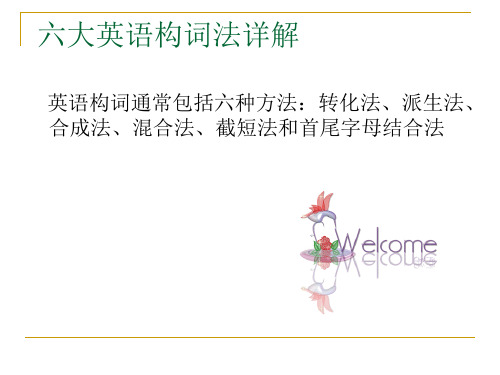
现在分词+名词flying-fish飞鱼
形容词+名词freshman大一新生 副词+动词outlook景色风光
5.合成代词 代词宾格+self herself 她自己 物主代词+self myself 我自己 形容词+名词anything 一切 6.合成介词 副词+名词outside在……外面 介词+副词within在……之内 副词+介词into进入
四、英语词汇构词法之截短法缩略法
将单词缩写词义和词性保持不变的英语构词法称为截 短法主要有截头、去尾、截头去尾等形式 讲义.截头 telephone→phone airplane→plane 2.去尾 mathematics→maths examination→exam kilogram→kilo laboratory→lab taxicab→taxi
讲义表示颜色的形容词常可转化为名词如:
The girl in black appears very beautiful.那个 穿黑衣服的女孩子看上去非常漂亮
2一些形容词如old young poor rich wounded injured等与the连用表示一类人作主语时谓语 用复数如:
We don't belong to the rich but we don't belong to the poor either. 我们不是有钱人但 我们也不是穷人
二、英语词汇构词法之派生法
英语构词法中在词根前面加前缀或在词根后 面加后缀从而构成一个与原单词意义相近或截 然相反的新词的方法叫作派生法 讲义.前缀 除少数英语前缀外前缀一般改变单词的意义 不改变词性;英语后缀一般改变词类而不引起 词义的变化
英语构词法
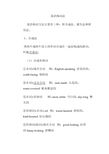
英语构词法英语构词方法主要有三种:即合成法、派生法和转化法。
1、合成法将两个或两个以上的单词合成在一起而构成的新词,叫做合成词。
(1)合成形容词①名词+现在分词例:English-speaking 讲英语的,south-facing 朝南的②名词+过去分词例:man-made 人造的,water-covered 被水覆盖的③名词+形容词例:snow-white 雪白的,day-long 整天的④形容词+名词+-ed 例:warm-hearted 热情的,kind-hearted 好心肠的⑤形容词/副词+现在分词例:good-looking 好看的 funny-looking 滑稽的⑥副词+过去分词例:well-known 出名的,deep-set(眼睛)深陷的⑦副词/形容词+名词例:right-hand 右手的,full-time 专职的⑧数词+名词例:100-meter 100米的,million-pound 百万英镑的⑨数词+名词+形容词例:180-foot-high 180英寸高的,10-year-old 10岁的⑩数词+名词+-ed 例:four-footed/legged 四脚的,one-eyed 独眼龙的(2)合成名词①名词+名词例:weekend 周末,classroom 教室,bookshop 书店②形容词/介词+名词例:gentleman 绅士,loudspeaker 扬声器③动词+名词例:typewriter 打字机,cookbook 烹调书④名词+动词例:daybreak 破晓,toothpick 牙签⑤动词-ing形式+名词例:reading-room 阅览室,sleeping-car 卧车车厢⑥副词+动词例:outbreak 爆发,downpour 倾盆大雨⑦名词+动名词例:handwriting 笔迹,sun-bathing 日光浴⑧名词+in/to0+名词例:mother-in-law 岳母,brother-in-law 姐夫(3)合成动词①副词+动词例:overthrow 推翻,understand 理解②形容词+动词例:broadcast 广播,whitewash 粉刷③名词+动词例:typewrite 打字,sleepwalk 梦游(4)合成副词①介词+名词例:underfoot 脚下,beforehand 事先②形容词+名词例:hotfoot 匆忙地,someday 有朝一日③形容词+副词例:anywhere 任何地方,outwards 向外(5)合成介词:within在……之内,without没有,inside 在……里边,into进入(6)合成代词:myself我自己,ourselves我们自己,anyone任何人,nobody没有人nothing没东西,somebody 有人。
英语构词法
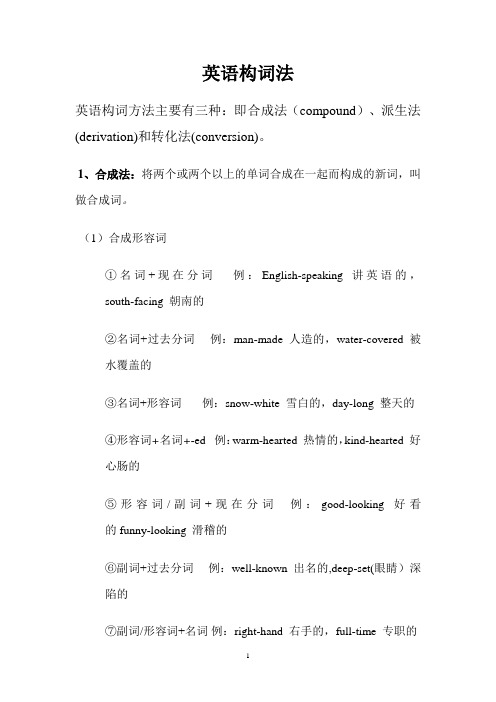
英语构词法英语构词方法主要有三种:即合成法(compound)、派生法(derivation)和转化法(conversion)。
1、合成法:将两个或两个以上的单词合成在一起而构成的新词,叫做合成词。
(1)合成形容词①名词+现在分词例:English-speaking 讲英语的,south-facing 朝南的②名词+过去分词例:man-made 人造的,water-covered 被水覆盖的③名词+形容词例:snow-white 雪白的,day-long 整天的④形容词+名词+-ed 例:warm-hearted 热情的,kind-hearted 好心肠的⑤形容词/副词+现在分词例:good-looking 好看的 funny-looking 滑稽的⑥副词+过去分词例:well-known 出名的,deep-set(眼睛)深陷的⑦副词/形容词+名词例:right-hand 右手的,full-time 专职的⑧数词+名词例:100-meter 100米的,million-pound 百万英镑的⑨数词+名词+形容词例:180-foot-high 180英寸高的,10-year-old 10岁的⑩数词+名词+-ed 例:four-footed/legged 四脚的,one-eyed 独眼龙的(2)合成名词①名词+名词例:weekend 周末,classroom 教室,bookshop书店②形容词/介词+名词例:gentleman 绅士,loudspeaker 扬声器③动词+名词例:typewriter 打字机,cookbook 烹调书④名词+动词例:daybreak 破晓,toothpick 牙签⑤动词-ing形式+名词例:reading-room 阅览室,sleeping-car卧车车厢⑥副词+动词例:outbreak 爆发,downpour 倾盆大雨⑦名词+动名词例:handwriting 笔迹,sun-bathing 日光浴⑧名词+in/to+名词例:mother-in-law 岳母,brother-in-law 姐夫(3)合成动词①副词+动词例:overthrow 推翻,understand 理解②形容词+动词例:broadcast 广播,whitewash 粉刷③名词+动词例:typewrite 打字,sleepwalk 梦游(4)合成副词①介词+名词例:underfoot 脚下,beforehand 事先②形容词+名词例:hotfoot 匆忙地,someday 有朝一日③形容词+副词例:anywhere 任何地方,outwards 向外(5)合成介词:within在……之内,without没有,inside在……里边,into进入(6)合成代词:myself我自己,ourselves我们自己,anyone任何人,nobody没有人nothing没东西,somebody有人。
英语单词构词法

英语的构词法主要有:
一、加词缀法(affixation)
加词缀法分为屈折变化法(inflexion) 和派生法(derivation)。
屈折变化法是指词尾有表示名词复数、格、第三人称单数、动词时态的后缀以及有表示形容词和副词比较级和最高级的后缀。
派生法是给词根添加上前缀或后缀而构词。
二、复合法(compound)
复合词大部分由两个自由词素构成。
三、缩合法(blending)
用两个或两个以上自由词素各自的一部分构成新词。
四、转化法(conversion)
(
1. 名词转化为动词
2. 动词转化为名词
3. 形容词转化为动词
五、缩写法(abbreviation)
缩写法主要有下列六种:
1. 缩略(clipping)
2. 首字母缩略词(initialism)
3. 省略(omission)
4. 缩约(contraction)
5. 替换(substitution)
^
具体方法如下:。
英语单词构词法

英语的构词法主要有:
一、加词缀法(affixation)
加词缀法分为屈折变化法(inflexion)和派生法(derivation) 0
屈折变化法是指词尾有表示名词复数、格、第三人称单数、动词时态的后缀以及有表示形容词和副词比较级和最高级的后缀。
派生法是给词根添加上前缀或后缀而构词。
二、复合法(compound)
复合词大部分由两个自由词素构成。
三、缩合法(blending)
用两个或两个以上自由词素各自的一部分构成新词。
四、转化法(conversion)
1.名词转化为动词
2.动词转化为名词
3.形容词转化为动词
五、缩写法(abbreviation)
缩写法主要有下列六种:
1.缩略(clipping)
2.首字母缩略词(initialism)
3.省略(omission)
4.缩约(contraction)
5.替换(substitution)
具体方法如下:。
完整版)六大英语构词法详解
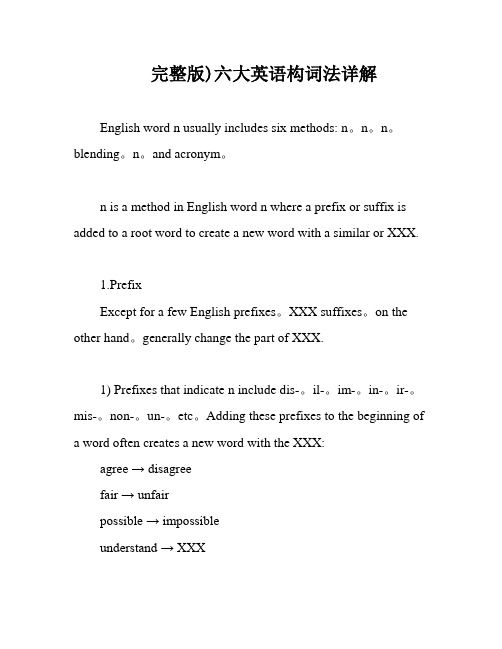
完整版)六大英语构词法详解English word n usually includes six methods: n。
n。
n。
blending。
n。
and acronym。
n is a method in English word n where a prefix or suffix is added to a root word to create a new word with a similar or XXX.1.PrefixExcept for a few English prefixes。
XXX suffixes。
on the other hand。
generally change the part of XXX.1) Prefixes that indicate n include dis-。
il-。
im-。
in-。
ir-。
mis-。
non-。
un-。
etc。
Adding these prefixes to the beginning of a word often creates a new word with the XXX:agree → disagreef air → unfairpossible → impossibleunderstand → XXX2) Other common prefixes include a- (often used to form predicate adjectives)。
anti- (against。
resistant)。
auto- (self)。
co- (together)。
en- (to cause to be)。
inter- (mutual)。
re- (again)。
sub- (under。
lesser)。
tele- (emphasizing distance)。
etc。
For example:co-workerXXXcooperaterewriteXXX2.SuffixAdding a suffix to a word is also an important method of English word XXX often change the part of speech of a word。
英语构词法详细讲解
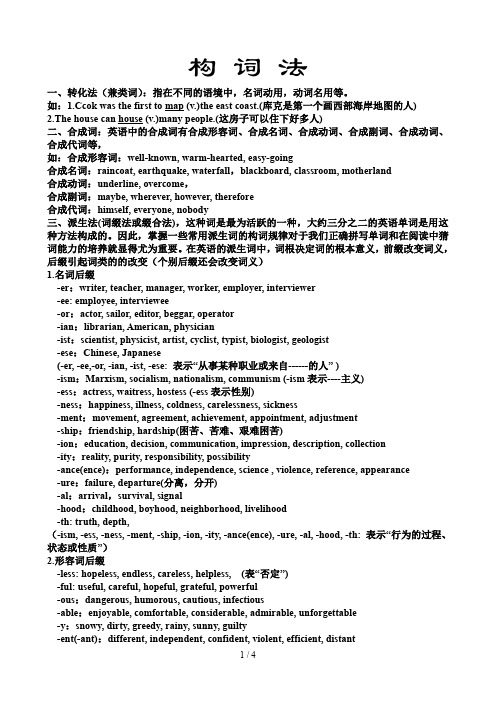
构词法一、转化法(兼类词):指在不同的语境中,名词动用,动词名用等。
如:ok was the first to map (v.)the east coast.(库克是第一个画西部海岸地图的人)2.The house can house (v.)many people.(这房子可以住下好多人)二、合成词:英语中的合成词有合成形容词、合成名词、合成动词、合成副词、合成动词、合成代词等,如:合成形容词:well-known, warm-hearted, easy-going合成名词:raincoat, earthquake, waterfall,blackboard, classroom, motherland合成动词:underline, overcome,合成副词:maybe, wherever, however, therefore合成代词:himself, everyone, nobody三、派生法(词缀法或缀合法),这种词是最为活跃的一种,大约三分之二的英语单词是用这种方法构成的。
因此,掌握一些常用派生词的构词规律对于我们正确拼写单词和在阅读中猜词能力的培养就显得尤为重要。
在英语的派生词中,词根决定词的根本意义,前缀改变词义,后缀引起词类的的改变(个别后缀还会改变词义)1.名词后缀-er:writer, teacher, manager, worker, employer, interviewer-ee: employee, interviewee-or:actor, sailor, editor, beggar, operator-ian:librarian, American, physician-ist:scientist, physicist, artist, cyclist, typist, biologist, geologist-ese:Chinese, Japanese(-er, -ee,-or, -ian, -ist, -ese: 表示“从事某种职业或来自------的人” )-ism:Marxism, socialism, nationalism, communism (-ism表示----主义)-ess:actress, waitress, hostess (-ess表示性别)-ness:happiness, illness, coldness, carelessness, sickness-ment:movement, agreement, achievement, appointment, adjustment-ship:friendship, hardship(困苦、苦难、艰难困苦)-ion:education, decision, communication, impression, description, collection-ity:reality, purity, responsibility, possibility-ance(ence):performance, independence, science , violence, reference, appearance-ure:failure, departure(分离,分开)-al:arrival,survival, signal-hood:childhood, boyhood, neighborhood, livelihood-th: truth, depth,(-ism, -ess, -ness, -ment, -ship, -ion, -ity, -ance(ence), -ure, -al, -hood, -th: 表示“行为的过程、状态或性质”)2.形容词后缀-less: hopeless, endless, careless, helpless, (表“否定”)-ful: useful, careful, hopeful, grateful, powerful-ous:dangerous, humorous, cautious, infectious-able:enjoyable, comfortable, considerable, admirable, unforgettable-y:snowy, dirty, greedy, rainy, sunny, guilty-ent(-ant):different, independent, confident, violent, efficient, distant-tic: optimistic, pessimistic, enthusiastic, characteristic-ary: necessary, revolutionary, imaginary-(c)al: historical, unusual, professional, magical, physical, universal, classical, logical, informal-some:handsome,troublesome-en:woolen, golden,-an:African, American-ive:active, attractive, creative(-ful, -ous, -able, -y, -ent, -some, -en, -an, -ive :表示“属性、倾向、相像”)3.副词后缀-ly:really, nearly, differently, finally, fluently, gradually-wise: (表示“方向、样子、状态、在------方面”)likewise, otherwise-ward(s): upward, downward, inward, outward, backward, forward, afterwards4.动词后缀-ize(-ise): organize, apologize, specialize-en:harden, fasten(使固定、使牢固), soften-fy: beautify, simplify, classify-ate: separate, operate(-ize(-ise), -en, -fy, -ate: 表示“使成为、处理、作用”)5.反义词前缀un-: unfair, unknown, unlike, unwilling, unfit, unnecessary, unlikely, unkinddis-: dislike, disappear, disadvantageim-: impossible, immoral, impatient, impractical, improperin-: incorrect, inappropriate, informalnon-: nonsmoker, nonsense,non -drinker(un-, dis-, im-, in-, non-: 表示“无、不、非”)mis-: mistake, mislead, misunderstandmal-:malfunction(发生故障;不起作用)(mis-, mal: 表示“反动作”)6.其他表示空间、位置、方向、关系、程度的前缀(1) a- , up-, over-, sur-, super- : 表示“在------之上”aboard, uphill, overlook, surface, supermarket, superstar(2)extra-, ex-, out- :表示“在-----之外”:extraordinary, export, outside, outdoors(3)under-, sub-, vice- :表示“在----之下”:underground, subway, vice-president(4)inter-: 表示“两者间”:internet, international, interpersonal(5)co-, con-, col-, com-: 表示“相同、相等合作”coexist(共存,和平共处), connect, collect, combine(6)trans-:表示“移动” translate, transform, transmit(传输信号等),transfer(转让、转移)(7)anti-反,抗,阻:anti-black, antibody, anti-depressant(抗抑郁的)(8)re-再,又:rebuild, rewrite, retell(9)micro-microbiology, microcomputer, microscope, microwave(微波)(10)tele-:远距离的,远的:telephone, television, telescope, teleprinter(电传打印机)四、缩略词缩略:为了称说方便,使事物称谓中的成分进行有规律的节缩或者省略叫做缩略。
英语四个构词法
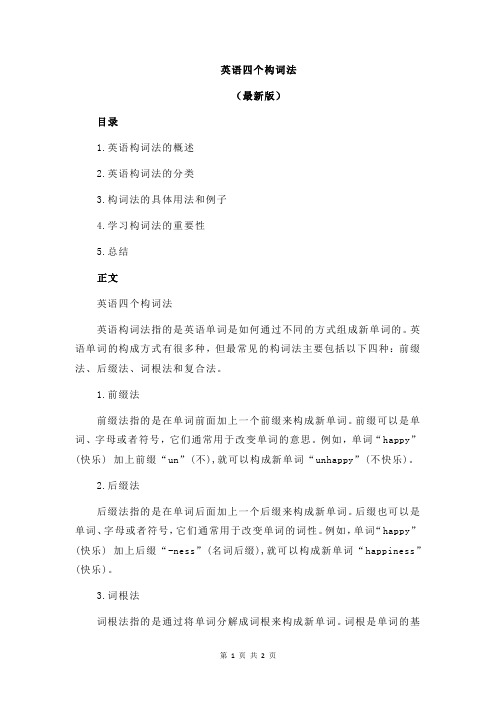
英语四个构词法(最新版)目录1.英语构词法的概述2.英语构词法的分类3.构词法的具体用法和例子4.学习构词法的重要性5.总结正文英语四个构词法英语构词法指的是英语单词是如何通过不同的方式组成新单词的。
英语单词的构成方式有很多种,但最常见的构词法主要包括以下四种:前缀法、后缀法、词根法和复合法。
1.前缀法前缀法指的是在单词前面加上一个前缀来构成新单词。
前缀可以是单词、字母或者符号,它们通常用于改变单词的意思。
例如,单词“happy”(快乐) 加上前缀“un”(不),就可以构成新单词“unhappy”(不快乐)。
2.后缀法后缀法指的是在单词后面加上一个后缀来构成新单词。
后缀也可以是单词、字母或者符号,它们通常用于改变单词的词性。
例如,单词“happy”(快乐) 加上后缀“-ness”(名词后缀),就可以构成新单词“happiness”(快乐)。
3.词根法词根法指的是通过将单词分解成词根来构成新单词。
词根是单词的基本部分,通常是一个或多个字母。
例如,单词“correct”(正确) 可以分解成词根“cor”(共同) 和“rect”(直),然后通过加上后缀“-ly”(副词后缀) 来构成新单词“correctly”(正确地)。
4.复合法复合法指的是将两个或多个单词组合在一起来构成新单词。
例如,单词“book”(书) 和“shop”(商店) 可以组合在一起构成新单词“bookshop”(书店)。
学习构词法对于学习英语非常重要。
它可以帮助我们更好地理解单词的意思和用法,并且可以帮助我们更容易地记住单词。
通过学习构词法,我们可以更好地掌握英语单词,提高我们的英语水平。
英语八大构词法
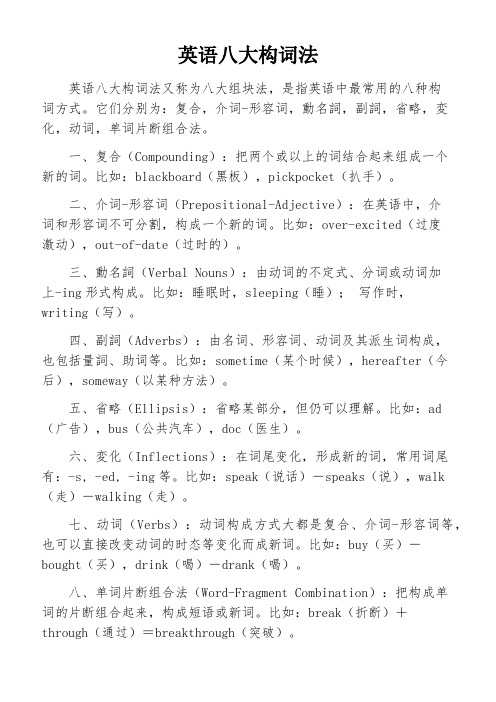
英语八大构词法英语八大构词法又称为八大组块法,是指英语中最常用的八种构词方式。
它们分别为:复合,介词-形容词,動名詞,副詞,省略,変化,动词,单词片断组合法。
一、复合(Compounding):把两个或以上的词结合起来组成一个新的词。
比如:blackboard(黑板),pickpocket(扒手)。
二、介词-形容词(Prepositional-Adjective):在英语中,介词和形容词不可分割,构成一个新的词。
比如:over-excited(过度激动),out-of-date(过时的)。
三、動名詞(Verbal Nouns):由动词的不定式、分词或动词加上-ing形式构成。
比如:睡眠时,sleeping(睡);写作时,writing(写)。
四、副詞(Adverbs):由名词、形容词、动词及其派生词构成,也包括量詞、助词等。
比如:sometime(某个时候),hereafter(今后),someway(以某种方法)。
五、省略(Ellipsis):省略某部分,但仍可以理解。
比如:ad (广告),bus(公共汽车),doc(医生)。
六、変化(Inflections):在词尾变化,形成新的词,常用词尾有:-s, -ed, -ing等。
比如:speak(说话)-speaks(说),walk (走)-walking(走)。
七、动词(Verbs):动词构成方式大都是复合、介词-形容词等,也可以直接改变动词的时态等变化而成新词。
比如:buy(买)-bought(买),drink(喝)-drank(喝)。
八、单词片断组合法(Word-Fragment Combination):把构成单词的片断组合起来,构成短语或新词。
比如:break(折断)+through(通过)=breakthrough(突破)。
英语八大构词法是一种有效的英语学习方法,使用者能够更全面、更系统的了解和掌握单词的构成方式和意思,从而更好地提高学习英语的效率。
七种构词法及例子
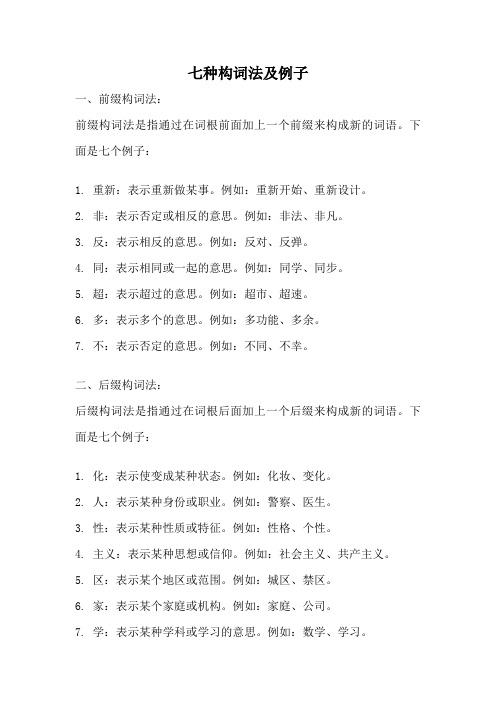
七种构词法及例子一、前缀构词法:前缀构词法是指通过在词根前面加上一个前缀来构成新的词语。
下面是七个例子:1. 重新:表示重新做某事。
例如:重新开始、重新设计。
2. 非:表示否定或相反的意思。
例如:非法、非凡。
3. 反:表示相反的意思。
例如:反对、反弹。
4. 同:表示相同或一起的意思。
例如:同学、同步。
5. 超:表示超过的意思。
例如:超市、超速。
6. 多:表示多个的意思。
例如:多功能、多余。
7. 不:表示否定的意思。
例如:不同、不幸。
二、后缀构词法:后缀构词法是指通过在词根后面加上一个后缀来构成新的词语。
下面是七个例子:1. 化:表示使变成某种状态。
例如:化妆、变化。
2. 人:表示某种身份或职业。
例如:警察、医生。
3. 性:表示某种性质或特征。
例如:性格、个性。
4. 主义:表示某种思想或信仰。
例如:社会主义、共产主义。
5. 区:表示某个地区或范围。
例如:城区、禁区。
6. 家:表示某个家庭或机构。
例如:家庭、公司。
7. 学:表示某种学科或学习的意思。
例如:数学、学习。
三、合成构词法:合成构词法是指通过将两个或多个词根结合在一起形成新的词语。
下面是七个例子:1. 电脑:由“电”和“脑”两个词根组成,表示一种用电做计算的机器。
2. 高速:由“高”和“速”两个词根组成,表示速度很快的意思。
3. 机器人:由“机器”和“人”两个词根组成,表示一种能够模仿人类行为的机器。
4. 电话:由“电”和“话”两个词根组成,表示通过电线传递声音的通信工具。
5. 自行车:由“自行”和“车”两个词根组成,表示人力驱动的两轮交通工具。
6. 火车:由“火”和“车”两个词根组成,表示以蒸汽或电力为动力的铁路交通工具。
7. 地球:由“地”和“球”两个词根组成,表示地球这个星球。
四、转化构词法:转化构词法是指通过改变词性或词类的方式构成新的词语。
下面是七个例子:1. 打:从动词转化为名词,表示击打的动作或声音。
例如:一打、拳打脚踢。
2. 红:从形容词转化为名词,表示红色。
英语构词法讲解

英语单词构词法 1前缀1.表示否定意义的前缀1纯否定前缀a-, an-, asymmetry不对称anhydrous无水的dis- dishonest, dislikein-, ig-, il, im, ir, incapable, inability, ignoble, impossible, immoral, illegal, irregularne-, n-, none, neither, nevernon-, noesenseneg-, neglectun- unable, unemployment2表示错误的意义male-, mal-, malfunction, maladjustment失调mis-, mistake, misleadpseudo-, pseudonym假名, pseudoscience3表示反动作的意思de-, defend, demodulation解调dis-, disarm, disconnectun-, unload, uncover4表示相反,相互对立意思anti-, ant- antiknock 防震, antiforeign,排外的contra-, contre-, contro-, contradiction, controflow逆流counter-, counterreaction, counterbalance ob-, oc-, of-, op-, object, oppose, occupy with-, withdraw, withstand2. 表示空间位置,方向关系的前缀1a- 表示“在……之上”,“向……”aboard, aside,2by- 表示“附近,邻近,边侧”bypath, bypass弯路3circum-, circu-, 表示“周围,环绕,回转”circumstance, circuit4de-, 表示“在下,向下”descend, degrade5en-, 表示“在内,进入”encage, enbed上床6ex-, ec-, es-, 表示“外部,外”exit, eclipse, expand, export7extra-, 表示“额外”extraction 提取8fore- 表示“在前面”forehead, foreground9in-, il-, im-, ir-, 表示“向内,在内,背于”inland, invade, inside, import10inter-, intel-, 表示“在……间,相互”international, interaction, internet11intro-, 表示“向内,在内,内侧”introduce, introduce12medi-, med-, mid-, 表示“中,中间”Mediterranean, midposition13out-, 表示“在上面,在外部,在外”outline, outside, outward14over-, 表示“在上面,在外部,向上”overlook, overhead, overboard15post-, 表示"向后,在后边,次”postscript附言,16pre-, 表示"在前”在前面”prefix, preface, preposition17pro-, 表示“在前,向前”progress, proceed,18sub-, suc-, suf-, sug-, sum-, sup-, sur-, sus-, 表示“在下面,下”subway, submarine, suffix, suppress, supplement19super-, sur-, 表示“在…..之上”superficial, surface, superstructure20trans-, 表示“移上,转上,在那一边”translate, transform, transoceanic21under-, 表示“在…..下面,下的”underline, underground, underwater 22up-, 表示“向上,向上面,在上”upward, uphold, uphill上坡3. 表示时间,序列关系的前缀1ante-, anti-, 表示“先前,早于,预先”antecedent, anticipate,2ex-, 表示“先,故,旧”expresident, exhusband3fore-, 表示“在前面,先前,前面”foreward, dorecast, foretell预言4mid-, medi-, 表示“中,中间”midnight, midsummer5post-"表示“在后,后”postwar,6pre-, pri-, 表示“在前,事先,预先”preheat, prewar, prehistory7pro-, 表示“在前,先,前”prologue序幕,prophet预言家8re-, 表示“再一次,重新”retell, rewrite4. 表示比较程度差别关系的前缀1by-, 表示“副,次要的”byproduct, bywork副业2extra-,表示“超越,额外”extraordinary,3hyper- 表示“超过,极度”hypersonic超声波, hypertesion高血压4out-,表示“超过,过分”outdo超过, outbid出价过高的人5over-,表示“超过,过度,太”overeat, overdress, oversleep6 sub-, suc-, sur-,表示“低,次,副,亚”subeditor, subordinate, subtropical亚热带7super-, sur- 表示“超过”supernature, superpower, surplus, surpass8under-,表示“低劣,低下”undersize, undergrown, underproduction生产不足9vice- 表示“副,次”vicepresident, vicechairman5. 表示共同,相等意思的前缀1com-, cop-, con-, cor-, co- 表示“共同,一起”; connect, combine, collect, combat, coexist, co-operate 2syn-, syl-,sym-,表示“同,共,和,类”symmetry, sympathy, synthesis合成6. 表示整个完全意思的前缀1al- 表示“完整,完全”alone, almost,2 over-表示“完全,全”overall, overflow充满3 pan-表示“全,总,万”panentheism泛神论,panorama7. 表示分离,离开意思的前缀1a- ab-, abs-,表示“分离,离开” away, apart, abstract, abstain 2de- 表示“离去,处去”depart, decolour,3dis-, di-, dif-, 表示“分离,离开” divorce, disarm缴械4ex-, e-, 表示“离开,分离”expel, exclude, expatriate驱出国外5for- 表示“离开,脱离”forget, forgive6表示“离开”release, resolve7表示“分离,隔离”separate, seduce, select8. 表示通过,遍及意思的前缀1dia-,表示“通过,横过”diameter, diagram,2per-, pel-, 表示“通,总,遍”perfect, perform, pervade浸透3trans-, 表示“横过,贯通”transparent, transmit, transport9. 表示加强意思的前缀a-, arouse, ashamedad-, adjoin, adhere 粘着10. 表示变换词类作用的前缀be-, befriend,en-, enslave, enable, enrichad-, ac-, af-, ag-, an-, ap-, ar-, as-, at-, adapt, accord, affix, aggression, arrive, assist, attend, attract, arrange, assign委派11. 表示数量关系的前缀1表示“单一”,“一”mon-, mon-, monotone单调,monopoly, monarchuni-, un-, uniform, unicellular单细胞2表示“二,两,双”ambi-, ambiguous, amphibian两栖类bi-, bin- bicycle, di-, diode二级管,twi-, twilight3表示“十”deca, deco-, dec- deci-, decade, decimals4表示"百,百分子一"hecto-, hect-, hectometer,centi-, centimeter5表示"千,千分子一” kilo-, kilometer6表示"万,万分子一”myria-, myri-, myriametremega-, meg-, megabytemicro-, microvolt 微伏特7表示"许多,复,多数”multi-, mult-, multipmetre 万用表poly-, polysyllable,8表示“半,一半”hemi-, hemispheredemi-, demiofficialsemi-, semiconductor, semitransparentpene-, pen-, peninsula12. 表示特殊意义的前缀1arch-, 表示“首位,第一的,主要的”architect, archbishop2auto-, 表示“自己,独立,自动”automobile, autobiography3bene-, 表示“善,福”benefit4eu-, 表示“优,美好”eugenics优生学,euphemism5male-, mal- 表示“恶,不良”maltreatment, malodor,6macro-, 表示“大,宏大”macroscopic宏观7magni-, 表示“大”magnificent8micro-, 表示“微”microscope13. 表示术语的前缀1aud-, 表示“听,声”audience,2bio-, 表示“生命,生物”biography传记3ge-, 表示“地球,大地”geography4phon-, 表示“声,音调”phonograph5tele-, 表示“远离”television, telephone英语构词法研究2词尾1 表示人,动作者的名词字尾----------------------------------------1. -ain 法 captain 队长,船长villain 坏人,恶棍chaplain 礼拜堂牧师2. -aire 法millionaire 百万富翁billionaire 亿万富翁3. -an 拉 German 德国人-ian 拉 barbarian 野蛮人-ese 法 Chinese 中国人用以表示种族或籍贯4. -ant 拉/法 applicant 申请人-ent 拉/法component 组成要素-and 拉/法 detergent 清洁剂-end 拉/法multiplicand 被乘数dividend 被除数1也可表示剂器物等意义2-and,-end 极少见,多用於数学名词5. -ary 拉 secretary 秘书,书记adversary 敌手,对手6. -ate 拉 advocate 鼓吹者,倡导者candidate 候选人magnate 要人,大企业家7. -ee 法employee 雇员nominee 被提名者referee 裁判,调解人1表示动作的承受者或受影响者,与-er反义2重音绝多在-ee上8. -eer 法 engineer 工程师pioneer 拓荒者,先锋volunteer 志愿者1表示从事..的人2重音在-eer上9. -er 古英 container 容器,货柜-or 古英 dictator 独裁者-ar 古英 burglar 窃盗-ier 法 premier首相,总理-eur 法 connoisseur 行家也可表示器物10. -ess 法 actress 女演员empress 女皇帝hostess 女主人表示女性11. -ician 法 electrician 电气技师musician 音乐家physician 内科医生1表示精通之人,能手的意思2多加於以 -ic 或 -y 结尾的名词上12. -ist 希腊 typist 打字员antagonist 敌手dogmatist 武断的人表示相信某学说的人,或致力於某学科,熟练掌握技术的人13. -ite 希腊 cosmopolite 四海为家者Israelite 以色列人表示和某团体有关的人14. -ive 法 native 土着,本地人captive 俘虏fugitive 逃亡者,亡命者原系形容词字尾,引申而成名词字尾15. -man 古英 chairman 主席-sman 古英 statesman 政治家stuntsman 特技表演者16. -on 拉champion 冠军,斗士companion 同伴patron 赞助人,顾客17. -ster 古英 minister 大臣,牧师spinster 纺织女工gangster 强盗集团分子2表示抽象名词字尾1. -ace 拉 menace 恐吓,威胁grimace 痛苦表情solace 安慰,慰藉2. -ad 希腊 tetrad 四个一组-ade 希腊/法 decade 十年blockade 封锁ambuscade 埋伏tirade 长篇大论1部分与数字有关2有时可兼作动词,如例字 ambuscade与 blockade 即是3. -age 法 shrinkage 缩小,减少passage 通过,通道foliage 树叶集合词表示行为结果或总称4. -al 拉 proposal 提议,求婚brtrayal 背叛disposal 处理,解决表示动作或行为5. -ance 拉/法 hindrance 阻碍-ancy 拉/法forbearance 节制-ence 拉/法 constancy 不变-ency 拉/法resilience 弹性tendency 倾向表示性质或动怍6. -cy 拉 intimacy 亲近,交情advocacy 提倡,鼓吹bankruptcy 破产1表示状态或职务2多加於以 -ate 或 -t 结尾的名词,动词,形容词上7. -dom 古英 freedom 自由wisdom 智慧martyrdom 殉道,殉难1表示状态,等级,领土2多加於名词,形容词上8. -hood 古英childhood 幼年时期livelihood 生活,生计likelihood 希望,可能表示年纪,状况,亲属关系9. -ia 希腊/拉 mania 疯狂,狂热militia 自卫队hydrophobia 恐水症多表示疾病10. -ic 希腊 logic 逻辑-ics 拉 magic 魔术,魔力physics 物理学aerobatics 特技飞行术表示学术,技术11. -ice 法 avarice 贪婪-ise 法 caprice 善变treatise 论述,论文12. -ing 古英 ageing 上年纪clothing 衣服集合词casing 箱,套,框子1表示总称或具体意义2多加於名词,动词上13. -ion 拉 opinion 意见diffusion 散布,蔓延assertion 主张,断言1表示动作及其过程2加於动词之后3以 -sion,-tion,-ation三种形态最为常见14. -ism 希腊 criticism 批评exoticism 异国情趣antagonism 反对communism 共产主义1表示制度,主义,行为,状态2加於名词,形容词上15. -itude 拉aptitude 适当性,倾向rectitude 正直,正确fortitude 不屈不挠1表示度量或情况2加於形容词之后16. -ity 拉 brevity 简短curiosity 好奇心elasticity 弹性,伸缩力加於形容词之后,使成抽象名词17. -ment 拉 instrument 仪器fulfillmant 实践,达成filament 细丝,细线1表示行为,行为结果,工具等2加於动词上18. -mony 拉 harmony 和谐ceremony 仪式testimony 证言,宣誓19. -ness 古英 friendliness 友好abrasiveness 摩擦adhesiveness 黏性1表示状态2加於形容词或分词上20. -our 拉 behaviour 行为ardour 热心,热切endeavour 努力,尽力-or 为美式拼法,-our 为英式拼法21. -ry 法 bravery 英勇,美好-ery 法 treasury 宝藏,国库artistry 艺术才能machinery 机器集合1表示行为,技术,总称,地点等意义2加於名词,动词,形容词上22.-ship 古英 relationship 关系fellowship 交情workmanship 手艺1表示状态,性质,职务,技术等意义2加於名词之后23. -th 古英warmth 热情breadth 宽度width 广博1表示情况或性质2加於动词,形容词上24. -ty 拉 cruelty 残酷penalty 处罚bounty 慷慨,赏金1表示性质或状态2加於形容词上25. -ure 法 seizure 捕获,扣押disclosure 发觉,暴露expenditure 开支,经费1表示行为及其结果2加於动词或字根上26. -y 拉 modesty 谦逊,朴素assembly 会议,组合analogy 类似,相似1表示状态2加於动词,名词,形容词之后3 表示小的名词字尾1. -cle 法 miracle 奇迹particle 分子,粒子speckle 小斑点表示个体,个别的意义2. -cule 拉 minuscule 小字molecule 分子grancule 小粒,颗粒3. -el 法 vessel 船只-le 古英 model 模型pebble 小鹅卵石riddle 谜4. -en 古英 kitten 小猫-in 古英 maiden 少女bulletin 公告,告示5. -et 法 cabinet 小柜子,会议室-ette 法banquet 宴会islet 小岛gazette 公报,报纸6. -ie 古英 birdie 小鸟-y kitty 小猫pony 小马用於人名的昵称,如 Sammy,Bobbie 等7. -kin 古英 napkin 餐巾manikin 侏儒cannikin 小杯,小罐8. -let 法 leaflet 小叶子pamphlet 小册子hamlet 小村落9. -ling 古英 underling 部下,下属seedling 苗,幼木duckling 小鸭4其他名词字尾1. -ary 法dictionary 字典vocabulary 字汇,语汇表示集合体2. -ary 拉 dispensary 药局-ory 拉 factory 工厂-arium 拉 aquarium 水族馆-orium 拉 auditorium 讲堂,礼堂表示处所3.-ful 古英 handful 一把,少数monthful 一口,少量armful 一抱,满怀1源出full a.流满的2表示流满,一..之量的意思4. -mer 希腊polymer 聚合体dimer 二量体plastomer 塑料表示部分的意义5. -oid 希腊 asteroid 小行星leatheroid 人造皮paraboloid 抛物线体1表示像..似的或有质量的2加在名词或动词之后3也可作形容词字尾6. -ology 希腊 biology 生物学zoology 动物学ecology 生态学表示学科1. -able 拉 comparable 比得上的-ible 拉 explicable 可解释的audible 可听见的feasible 可达成的1表示能..的的意思2加於绝大多数及物动词与少数不及物动词之后2. -al 拉 equal 平等的partial 部分confidential 机密的1表示属性2加於名词上3. -an 拉 republican 共和国的-ian 拉agrarian 土地的-ean 拉 Parisian 巴黎的Archemedean 阿基米德的1表示地名或人名2多加於专有名词上4. -ant 拉 radiant 发光的-ent 拉 buoyant 有浮力的diligent 用心的quiescent 静止的1表示性质2加於动词词干上3与名词字尾 -ance,-ence 同源5. -ar 拉familiar 熟悉的spectacular 壮观的muscular 强壮的多加於名词词干上6. -ary 拉 arbitrary 独断的-ory 拉 exemplary 模范的compulsory 强制的dilatory 慢吞吞的表示性质或状态7. -ate 拉 ornate 装饰华丽的sedate 沈着安静的cognate 同族的表示性质或状态8. -ed 古英 aged 年老的assorted 各式各样的sophisticated 复杂的加於名词或动词之后9. -en 古英 golden 金制,金色的earthen 土,土制的brazen 黄铜制的加於物质名词上10. -ern 古英 eastern 东方的northern 北方的western 西方的加於表示方位的名词上11. -fold 古英 twofold 双倍的threefold 三倍的manifold 多倍的1多加於二以上的基数词上,表示倍数2也可作副词字尾12. -ful 古英regretful 惋惜的fruitful 有利的bashful 害羞的1源出 full充满的2表示充满或引起..的的意思3大多加於名词或少数动词上13. -ic 拉 endemic 地方性的-ical 拉 economical 节约的symbolical 象徵性的1多加於名词之后2转成副词时,改为 -ically 的形态14. -id 拉candid 公正,耿直的languid 无力的limpid 清澄的表示性质15. -ile 法 facile 容易的hostile 敌视的juvenile 年轻的表示易於..的的意思16. -ine 法 divine 神圣,庄严的genuine 真正的sanguine 气色好的表示性质17. -ing 古英 pressing 紧迫,切实的agonizing 烦恼,苦闷的unflagging 不衰的加於动词上,由现在分词转为形容词18. -ior 拉 interior 内部的superior 上好的inferior 下等的原系拉丁文形容词比较级字尾19. -ique 法 unique 独特的-esque 法antique 古代的grotesque 怪异的表示风格20. -ish 古英 bitterish 带苦味的selfish 自私的childish 孩子气的Polish 波兰的表属性或不强的程度21. -ite 希腊/拉 infinite 无限的opposite 相对的favorite 中意的22. -ive 拉 massive 巨大,厚重的-ative 拉diffusive 散布,普及的deductive 推论,演绎的1表示关系,倾向,特性2多加於动词或动词词干上23. -less 古英aimless 漫无目的的groundless 无根据的odorless 无气味的1表示否定2加於名词之后3与 -ful 反义24. -like 古英 childlike 孩子似的womanlike 女人似的1表示相似2加於名词之后25. -ly 古英 earthly 地球的leisureley 从容的1表示外观相似的有..性质的反复发生的2加於名词上26. -most 古英innermost 深藏的foremost 第一流的utmost 最大限度的表示最高级27. -oid 希腊 asteroid 星状的cycloid 圆形的crystalloid 结晶状的1表示相像或质量2加於名词上3也可作名词字尾28. -ous 拉advantageous 有益的circulitous 迂曲的vigorous 精力充沛的1表示充满..的的意思2多加在名词上29. -proof 拉 waterproof 防水的weatherproof 耐风雨的foolproof 极简单的1表示防..的的意思2附在名词之后30. -some 古英 wearisome 使疲倦的winsome 引人注目的fulsome 令人生厌的1表示像..的引起..的的意思2加於名词,动词,形容词上31. -ward 古英 backward 向后,落后的awkward 笨拙的wayward 任性的1表示方向2也可作副词字尾32. -y 古英 foggy 朦胧的icy 如冰,极冷的notchy 有凹口的1大多表示充满或包含的意义2加在名词上1. -ate 拉 accumulate 累积,聚积-ute 拉 alternate 交互,交替attribute 归因persecute 迫害,困扰与名词字尾 -ation,-ution 同源2. -en 古英 lengthen 加长,延长worsen 变化,恶化enlighten 启发,教化enliven 使有活力加於名词或形容词上3. -er 古英 batter 敲打,乱轰flutter 飘动,飘飞glitter 闪烁chatter 喋喋不休大多表示拟声或反覆动作4. -esce 拉 acquiesce 默从evanesce 消散convalesce 渐渐康复大多表示动作开始5. -ify 拉 nullify 使无效,取消-efy 拉 mollify 缓和,抚慰liquefy 溶解,液化stupefy 使呆住多加於名词或形容词上6. ish 法 cherish 珍爱diminish 减少,缩小embellish 装饰,美化admonish 告诫7. -ize 拉 patronize 赞助,惠顾-ise 拉 summarize 摘要,概述-yze 希腊 pulverize 使成碎粉-yse 希腊 analyze 分析1表示以…方式做使成…化的意思2多加在名词或形容词上3前二种形态,-ize为美式拼法,-ise为英式拼法4-yze 和 -yse 的形态极为少见8. -le 古英 startle 吃惊,惊吓trickle 细流dwindle 缩小,下跌dazzle 使眩眼多表示反覆动作1. -fold 古英 hundredfold 百倍地trousandfold 千倍地manifold 多倍地1表示倍数2加於数词或个别代词之后3也可作形容词字尾2. -ly 古英roughly 约略地absolutely 绝对approximately 大约地多加於形容词或分词上3. -ward 古英 southward 向南地-wards 古英inward 向内地afterwards 其后1表示方向2加在介词,名词,形容词上3-ward 的形态也可作形容词字尾4. -way 古英 anyway 无论如何-ways 古英 sideways 斜地里endways 笔直地1表示方向或位置2与-wise 同源5. -wise 古英 otherwise 不然的话sidewise 斜地里crosswise 交叉地1表示方向或位置2部分可兼作形容词3与-way,-ways同源。
英语构词法详解及练习

介词+名词
downhill 下坡的
(3)合 成 动 词
构成方式
例词
名词+动词
sleep-walk 梦游
形容词+动词 white-wash 粉刷
副词+动词
overthrow 推翻
(4)合 成 副 词
构成方式
例词
形容词+名词 hotfoot 匆忙地
形容词+副词 everywhere 到处
副词+副词 however 尽管如此
近的其他词性;少数后缀还会改变词义,变为与原来 词义相反的新词。 (1)构成名词的后缀常用的有-ence,-(e)r/ -or (从事 某事的人),-ese (某地人),-ess (雌性),-ful (一……), -ian (精通……的人),-ist (专业人员),-ment (性质; 状态),-ness (性质;状态),-tion(动作;过程)等。例 如:
④某些抽象名词也可作动词。如: We lunched together.我们在一起吃了午餐。 3)形容词转化为动词
有少数形容词可以转化为动词。如: We will try our best to better our living conditions. 我 们要尽力改善我们的生活状况。
4)副词转化为动词 有少数副词可以转化为动词。例如: Murder will out.(谚语)恶事终必将败露。 5)形容词转化为名词
gold 金子→golden 金的
east 东→eastern 东方的
child 孩子→childish 孩子气的
snow 雪→snowy 雪的
(4)构成副词的常用后缀有-ly (主要用于形容词之后
表 示方式或程度),-ward(s) (主要用于表示方位的词
六大英语构词法详解
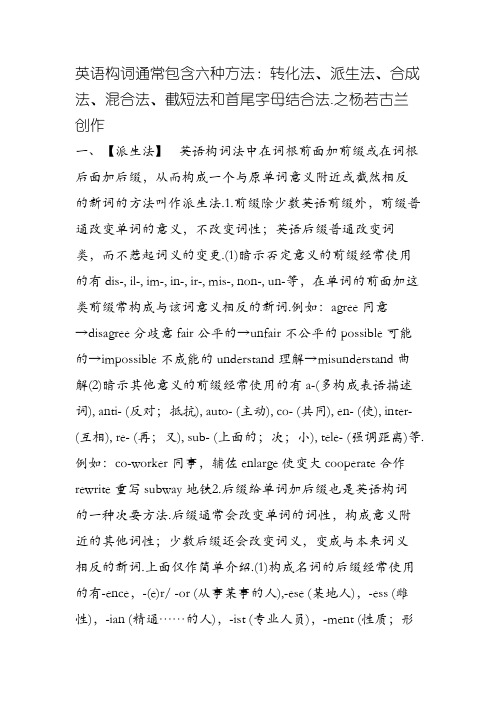
英语构词通常包含六种方法:转化法、派生法、合成法、混合法、截短法和首尾字母结合法.之杨若古兰创作一、【派生法】英语构词法中在词根前面加前缀或在词根后面加后缀,从而构成一个与原单词意义附近或截然相反的新词的方法叫作派生法.1.前缀除少数英语前缀外,前缀普通改变单词的意义,不改变词性;英语后缀普通改变词类,而不惹起词义的变更.(1)暗示否定意义的前缀经常使用的有dis-, il-, im-, in-, ir-, mis-, non-, un-等,在单词的前面加这类前缀常构成与该词意义相反的新词.例如:agree同意→disagree分歧意fair公平的→unfair不公平的possible可能的→impossible不成能的understand理解→misunderstand曲解(2)暗示其他意义的前缀经常使用的有a-(多构成表语描述词), anti- (反对;抵抗), auto- (主动), co- (共同), en- (使), inter- (互相), re- (再;又), sub- (上面的;次;小), tele- (强调距离)等.例如:co-worker 同事,辅佐enlarge 使变大cooperate 合作rewrite 重写subway 地铁2.后缀给单词加后缀也是英语构词的一种次要方法.后缀通常会改变单词的词性,构成意义附近的其他词性;少数后缀还会改变词义,变成与本来词义相反的新词.上面仅作简单介绍.(1)构成名词的后缀经常使用的有-ence,-(e)r/ -or (从事某事的人),-ese (某地人),-ess (雌性),-ian (精通……的人),-ist (专业人员),-ment (性质;形态),-ness (性质;形态),-tion(动作;过程)等.例如:differ 分歧于→diff erence区别write写→writer作家China中国→Chinese中国人act扮演→actress女演员music音乐→musician音乐家(2)构成动词的后缀经常使用的有-(e)n (多用于描述词以后),-fy (使……化),-ize (使……成为).例如:wide→widen加宽beauty→beautify美化pure→purify提纯real→realize认识到organ→organize组织sharp→sharpen使变锋利(3)构成描述词的后缀经常使用的有-al,-able (有能力的),-(a)n(某国人的),-en (多用于暗示材料的名词后),-ern (方向的),-ese(某国人的),-ful,-(ic)al,-ish,-ive,-less (暗示否定),-like (像……的),-ly,-ous,-some,-y (暗示天气)等.例如:nature天然→natural天然的reason道理→reasonable有道理的America美国→American美国的China 中国→Chinese中国人的gold金子→golden金的east东→eastern东方的child孩子→c hildish孩子气的snow雪→snowy雪的(4)构成副词的经常使用后缀有-ly (次要用于描述词以后暗示方式或程度),-ward(s) (次要用于暗示方位的词以后暗示方向).例如:angry生气的→angrily生气地to到→towards朝……,向……east东方→eastward向东(5)构成数词的后缀有-teen (十几),-ty (几十),-th (构成序数词).例如:six六→sixteen十六→sixteenth第十六four四→forty四十→fortieth第四十二、【合成法】英语构词法中把两个单词连在一路合成一个新词,前一个词润色或限制后一个词,如许的方法就是合成法.1.合成名词名词+名词weekend周末名词+动词daybreak黎明名词+动名词handwriting书法名词+及物动词+er/or pain-killer止痛药名词+介词+名词sister-in-law嫂子代词+名词she-wolf母狼动词+名词typewriter打字机动名词+名词reading-room阅览室此刻分词+名词flying-fish飞鱼描述词+名词freshman大一重生副词+动词outlook景色,风光介词+名词afterbrain后脑2.合成描述词名词+描述词bloodred血红的名词+此刻分词French-speaking讲法语的名词+to+名词one-to-one一对一的名词+过去分词man-made人造的数词+名词one-way单行道的数词+名词+描述词three-year-old三岁的数词+名词+ed ten-storeyed十层的动词+副词one-off 一次性的描述词+名词high-quality高质量的描述词+名词+ed noble-minded高尚的描述词+描述词light-green浅绿色的描述词+此刻分词ordinary-looking边幅普通的副词+描述词ever-green常青的副词+此刻分词hard-working辛苦的副词+过去分词well-known闻名的副词+名词fast-food专门提供快餐服务的介词+名词indoor室内的3.合成动词名词+动词sleep-walk梦游描述词+动词white-wash粉刷副词+动词overwhelm压服,礼服4.合成副词描述词+名词hotfoot匆忙地描述词+副词everywhere到处副词+副词however尽管如此介词+名词beforehand事先介词+副词forever永久5.合成代词代词宾格+self herself 她本人物主代词+self myself 我本人描述词+名词anything 一切6.合成介词副词+名词outside在……里面介词+副词within在……以内副词+介词into进入三、【转化法】英语构词法中把一种词性用作另一种词性而词形不变的方法叫作转化法,有的名词可以作动词,有的描述词可以作副词或动词.1.动词转化为名词1)意思没有变更,例如:I think we'd better finish the talk now.我想我们的谈话最好此刻结束.2)意思有必定变更,例如:He is a man of strong build.他是一个体格健壮的汉子.3)构成短语,例如:Let's have a look first. 我们先看一下吧.2.名词转化为动词1)暗示物体的,如:Have you booked the ticket?你订好票了吗?2)暗示身体部位的,如:Hand in your papers please.请把你们的试卷交上来.3)暗示一类人的,如:She nursed her husband back to health.她看护丈夫,使他恢复了健康.4)抽象名词,如:We breakfasted together.我们在一路吃了早饭.3.描述词转化为动词少数描述词可以转化为动词.例如:We will try our best to better our living conditions.我们要尽力改善我们的生活情况.4.副词转化为动词有少数副词可以转化为动词.例如:Murder will out.恶事终势必败露.5.描述词转化为名词1)暗示色彩的描述词常可转化为名词,如:The girl in black appears very beautiful.那个穿黑衣服的女孩子看上去非常漂亮.2)一些描述词如old, young, poor, rich, wounded, injured等与the连用,暗示一类人,作主语时,谓语用复数,如:We don't belong to the rich, but we dong't belong to the poor either. 我们不是有钱人,但我们也不是穷人.四、【截短法(缩略法)】将单词缩写,词义和词性坚持不变的英语构词法称为截短法,次要有截头、去尾、截头去尾等方式.1.截头telephone→phoneairplane→plane2.去尾mathematics→mathsexamination→examkilogram→kilolaboratory →labtaxicab→taxi3.截头去尾influenza→flurefrigerator→fridgeprescription→script五、【混合法(混成法)】英语构词还可以将两个词混合或各取一部分紧缩而成一个新词,前半部分表属性,后半部分表主体.如许的英语构词法就是混合法.newsbroadcast→newscast旧事广播television broadcast→telecast电视广播smoke and fog→smog烟雾photo andgraphy→photography摄影,摄影术helicopter airport→heliport 直升飞机场六、【首尾字母缩略法】用单词首尾字母构成一个新词的英语构词法叫做首尾字母缩略法.这类方式的英语构词生成的新词,读音次要有两种方式,即各字母分别读音;作为一个单词读音.Testing of English as a ForeignLanguage→TOEFL托福Teach English as a Foreign Language→TEFLTeach English as a SecondLanguage→TESLGraduate Record Examination→GRE美国研讨生入学考试1、名词: 可数(1)把握名词复数方式的构成①直接在词尾 + s(boys, pencils)②以ch, sh, s, x结尾的 + es(watches, buses)③以“辅音字母+ y”结尾的, 变y为i + es(families, cities)④以f, fe结尾的, 变f, fe为v + es(knives, leaves)⑤不规则变更(children, women, fish, tomatoes)留意①单复数同形的名词: sheep, Chinese, Japanese.②只要复数方式的词: people, trousers, clothes, thanks.(2)把握名词的所有格的两种暗示法①有生命的人或动物的所有格常在单词后边加's②无生命的事物的所有格用of.my mother's bag the dog's house the door of our classroom留意, 加's构成所有格时, 如果名词本人是以s结尾的则只加', 不加s.(3)不成数名词①不成数名词没有复数方式, 且前边不克不及用不定冠词, 也不克不及用数词作定语.②作主语时, 谓语动词用单数方式.③使用量词短语暗示数量.a piece of news a cup of tea2、冠词(1)把握不定冠词a和an的用法用在第一次提到的可数名词单数前或泛指一类人或物及固定词组中.(2)把握定冠词the的用法①用来特指某人或某物.②用活着界上独一无二的事物的名称前.③用在序数词和描述词第一流前.④用在姓氏的复数方式前, 暗示夫妇或一家人.⑤某些词组中的固定搭配.3、代词(1)分清人称代词的主格和宾格的用法①主格在句子中作主语.②宾格在句子中作宾语.(2)分清描述性物主代词和名词性物主代词的用法①描述词性物主代词后边必须跟着它所润色的名词.②名词性物主代词后边不克不及再跟名词.(3)反身代词的构成和用法反身代词在句中次要起强调感化, 词组有teach oneself, learn by oneself(4)把握以下不定代词的基本用法①some——一些.经常使用于肯定句, 可润色可数名词和不成数名词.any——一些, 任何.经常使用于任何否定句, 疑问句条件句中, 可润色可数名词和不成数名词.留意与some或any组合生成的词(something, somebody, someone, anything, anybody, anyone), 其用法与some和any基底细同.②each——可单独使用, 强调个体, 用于两者或两者以上的每个人或物, 可作名词和描述词使用.every——不成单独使用, 强调全体, 用于三者或以上的情况, 只能作描述词用.③both, all, neither, none, either, any, the other的区别.含义对象都都不任何(一个) 每(一个) 另(一个)two both neither either each the otherthree all none any every another(5)初步把握it用来暗示天然景象、时间、距离及作方式主语或方式宾语的用法.It's 3 o'clock in the afternoon.It's about 5 kilometres away.It's raining now.It's important to learn English well.You'll find it easy to make a kite.4、数词(1)把握基数词和序数词的构成及基本用法.留意以下几个序数词的写法:first, second, third, fifth, eighth, ninth, twelfth, twentieth, thirty-first one hundredth(2)把握千以内数字的写法:8, 231 eight thousand two hundred and thirty-one(3)把握年、月、日的表达法及日常交际用语中数字的表达法:(on) August seventh, 1979; page 58; Unit25; Class Three Grade One; the No.168 Middle School(4)把握以下词组的用法:hundreds of, thousands of, millions of, three hundred students 5、描述词和副词(1)描述词和副词的原级、比较级和第一流的构成及使用.①原级: 没有比较用原级, 特定句型用原级(as…as, not as…as, not so…as).②比较级: 两者比较用比较级, 句中有"A or B"句型或than.③第一流: 三者或三者以上比较用第一流, 句中有"A, B or C"句型或由in或of引出比较范围.④其它表达法: 比较级 + and + 比较级表“愈来愈……”, The + 比较级, the + 比较级表“越……越……”eg: ①Mike is tall.This room is as big as that one.This lesson isn't as interesting as lesson Three.Tom doesn't run so fast as Jack.②Which is b etter, this one or that one?My sister writes more carefully than my brother.③Who is the tallest, Jack, John or Tom?He is the most careful in our class.Changjiang River is the longest river in China.④Spring is coming. It's getting warmer and warmer.The barder he studied, the more knowledge he got.⑤描述词副词比较级和第一流的构成a、直接 + er / + estb、以e结尾的 + er / + estc、以辅音字母 + y结尾的变y为i + er / + estd、重读闭音节以一个辅音字母结尾的, 双写 + er / + este、不规则变更f、多音节和少数双音节的词, 在词前加more或most(2)易混的副词辨析:①already, 多用于肯定句, yet多用于否定句或疑问句中②to o, also, either都暗示“也”too和also都用于肯定句中, too常放在句尾, also常放在句中, either用于否定句的句尾.6、介词(1)暗示时间的介词in, on, atin——用于较长一段时间, 礼拜, 月份, 季节, 年, 朝代世纪或非特指的早、午、晚等.on——具体某一天或具体某一个早、午、晚.at——在某一点时间或某个瞬间.eg: in 1988, in the 21st century, in winter, in March, in the moring, on Saturday evening, on the May seventh, on a windy night, on the afternoon, of October 31st, at eight o'clock, at night, at noon, at the end of, at this moment, at this time, at the age of(2)in与after暗示“当前”时的区别in——暗示以此刻为起点的“当前”, 经常使用于将来时态中.after——经常使用于普通过去时态中, 暗示在过去某个时间以后.eg: We'll come back in two weeks.我们将在两周后回来.They came back after two weeks.两周当前, 他们回来了.(3)ago与before暗示“在……之前”时的区别ago——暗示从此刻算起的“之前”, 经常是“一段时间 + ago”before——暗示以过去为起点的“之前”时, 经常是“一段时间+ before”, 如果是:”“before + 一点时间”, 则只暗示在某一点之前.eg: He went to the library 2 hours ago.He said he had gone to the library 2 hours before.They will start before eight o'clock tomorrow morning.I went to bed before nine yesterday evening.(4)for与duringfor + 一段时间常暗示“持续了一段时间”, 而during则暗示在……期间eg: He has been in Beijing for 3 years.I was in Beijing during last summer.(5)in与at暗示方位时at——与小的地点连用, 有“在某一点”的含义.in——与大的地方连用有“在…范围以内”的含义.He was lost at the station.The twins were born in a big city.(6)over, above与on暗示“在……上”的区别. over——指没有接触面的正上方, 反义词是under. above——指没有接触面的上方, 在高一些的地位, 反义词是below.on——指有接触面的, 在……的概况上.The plane is above the clouds.The bridge is over the river.The cup is on the table.(7)熟练把握介词与动词、名词、描述词搭配构成的词组, 另外还要留意, 介词的后边要跟名词作它的宾语, 如果是动词, 则要变成动名词(doing)的方式.如: She is good at singing.I'm good at English.7、连词(1)把握连词的含义与用法and(和, 并), but(但是), or(否则, 或者), so(所以, 因而),when(当……的时候), either…or(或者……或者, 不是……就是), neither…nor(既不……也不……), so…that(如此……乃至于……)8、动词(1)熟练把握动词的此刻分词, 第三人称单数, 过去式, 和过去分词的构成.留意牢记不规则动词的过去式和过去分词.(2)把握四类动词的普通用法:①实义动词——分为及物和不及物两种, 在句中作谓语.②连系动词——be, look, feel, get, turn, become, keep等, 在句中与表语一路构成相当于谓语部分的系表结构.③助动词——帮忙谓语动词构成分歧的时态和否定句, 疑问句, 不克不及单独使用, 也无含义.④情态动词——可以说是一种特殊的助动词, 情态动词没有人称和数的变更, 后边必须跟动词本相, 而且本人不单有含义而且可以直接构成否定句和疑问句.(3)非谓语动词的习气用法, 必定要熟记1)begin to do sth 2)start to do sth3)decide to do sth 4)want to do sth5)(would) like to do sth 6)forget to do sth7)remember to do sth 8)love to do sth9)learn to do sth 10)need to do sth11)try to do sth 12)try not to do sth13)stop to do sth 14)ask sb.to do sth15)ask sb.not to do sth 16)like sb.to do sth17)teach sb.to do sth 18)tell sb.to do sth19)tell sb.to do sth 20)want sb.to do sth21)help sb.(to) do sth 22)let sb.do sth23)have sb.do sth 24)make sb.do sth25)had better do sth 26)had better not do sth27)feel / hear sb.do sth 28)watch / see sb.do sth29)why not do sth 30)be busy doing sth31)see / watch sb doing sth 32)feel / hear sb doing sth33)enjoy doing sth 34)finish doing sth35)keep (sb) doing sth 36)go on doing sth37)stop doing sth 38)like doing sth39)begin doing sth 40)start doing sth41)prevent sb from doing 42)stop sb / sth from doing sth 43)spend时间 / 金钱(in) doing sth 44)It takes sb. some time todo sth.45)It is good (wrong, easy, difficult, important…) to do sth46)It is time (for sb.) to do sth 47)be used for doing sth 48)will / would you please do sth 49)what about (doing) sth (4)能够区别使用以下动词1)tell, say, speak, talk2)bring, take, carry3)lend, borrow, keep4)listen, listen to, hear, hear from, hear of5)look, look at, see, watch, notice6)reach, arrive(in / at), get to7)look for, look after, look at, look up8)put on, put up, put down, put away, put into9)look for, find, find out, found10)take off, take away, take down11)try on , put on, wear, dress, get dressed12)ask for, send for13)get back, give back, take back14)be made in, be made of, be made from, be made by15)get on, got off, get into, get out of16)get in, get up, get on…with17)go down, go on, go out18)look out, look out of19)turn on, turn off, turn up, turn down, turn to, turn over20)send out, sent to , send away, send up, send for21)fill…with… be full of… be filled with…23)be in, be out, be away, be over, be up24)wear out, sell out25)worry about the worried about26)cost, pay, spend, take(5)留意延续性动词(段动词)与瞬间动词(点动词)在用法上的区别.瞬间动词有: join, buy, come, go, leave, arrive, begin, start, open, closed, become, borrow, lend, die, get等.记住: 瞬间动词(点动词)不克不及与暗示持续一段时间的时间状语连用.。
六大英语构词法详解
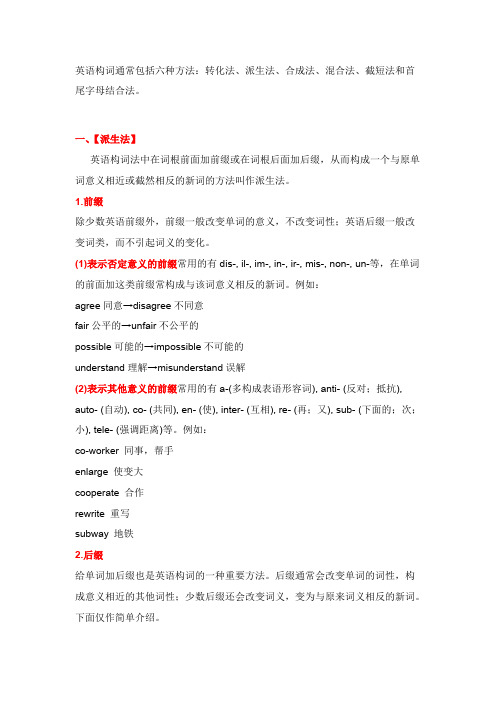
英语构词通常包括六种方法:转化法、派生法、合成法、混合法、截短法和首尾字母结合法。
一、【派生法】英语构词法中在词根前面加前缀或在词根后面加后缀,从而构成一个与原单词意义相近或截然相反的新词的方法叫作派生法。
1.前缀除少数英语前缀外,前缀一般改变单词的意义,不改变词性;英语后缀一般改变词类,而不引起词义的变化。
(1)表示否定意义的前缀常用的有dis-, il-, im-, in-, ir-, mis-, non-, un-等,在单词的前面加这类前缀常构成与该词意义相反的新词。
例如:agree同意→disagree不同意fair公平的→unfair不公平的possible可能的→impossible不可能的understand理解→misunderstand误解(2)表示其他意义的前缀常用的有a-(多构成表语形容词), anti- (反对;抵抗), auto- (自动), co- (共同), en- (使), inter- (互相), re- (再;又), sub- (下面的;次;小), tele- (强调距离)等。
例如:co-worker 同事,帮手enlarge 使变大cooperate 合作rewrite 重写subway 地铁2.后缀给单词加后缀也是英语构词的一种重要方法。
后缀通常会改变单词的词性,构成意义相近的其他词性;少数后缀还会改变词义,变为与原来词义相反的新词。
下面仅作简单介绍。
(1)构成名词的后缀常用的有-ence,-(e)r/ -or (从事某事的人),-ese (某地人),-ess (雌性),-ian (精通……的人),-ist (专业人员),-ment (性质;状态),-ness (性质;状态),-tion(动作;过程)等。
例如:differ不同于→difference区别write写→writer作家China中国→Chinese中国人act表演→actress女演员music音乐→musician音乐家(2)构成动词的后缀常用的有-(e)n (多用于形容词之后),-fy (使……化),-ize (使……成为)。
史上最全的构词法用法详解

史上最全的构词法用法详解史上最全的构词法用法详解构词法语言中词的总和构成词汇,但是词汇并不是一堆杂乱无章、互不相关的群体,而是一个严密体系,在这个结构的体系中,词与词之间有着各种各样的联系。
英语中的这些联系的规律总结起来就是构词。
英语中构词的方法就是构词法。
构词法主要有合成法、转化法、派生法和缩略法四种。
掌握构词法是迅速扩大词汇量的重要方法之一。
第一节合成法合成法就是指由两个或两个以上的单词合成的词叫合成词。
这种构词方式主要有两种:复合法、结合法。
合成法主要是构成合成名词和合成形容词。
复合法构成的复合词,它们各个结合的部分相互间的语法关系是紧密相关的。
如blackboard和darkroom都是形容词和名词形成的结构,writing desk是动词名词和名词形式的结构。
结合法形成的词是形态合成词,它的结合是用一个起来连接作用的中缀来把两个或两上以上的词根词素紧紧的连缀在一起。
如,用辅音字母-s-来缀全两个词根词素构成的词有:salesman, townspeople等。
合成的方式常见的有如下几种:一、合成名词1、名词/代词+名词:woman-doctor, women-doctors, workshop, spaceship, he-goat, coal fire, motorcycle, gas cooker, oil well, power plant, silk worm, gold mine, bottleneck, piano keys, telephone receiver, television screen, chairman, fireman, motorman, police-officer, postman, pine tree, girl friend, boy friend, goldfish, raindrop, birdcage, breakfast time, flowerbed, tearoom,2、动词+名词:blowpipe, flashlight, watchdog, call-girl, searchlight3、形容词+名词:blacksmith, blackboard, supermarket, superman, darkroom, blackbird, highchair, hothouse, greenhouse, madman4、动名词+名词:reading-room, sitting-room, classroom, schoolroom, dining room, building materials, dancing girl, cleaning women, flying machine, washing machine, working conditions, boilding point, drinking water, swimming pool, drinking cup, typing paper, writing desk, sewing machine, walking stick,5、名词+动名词:machine-building, shoe-making, paper-correcting, book-keeping, dressmaking, letter-writing, story-telling, town-planning, handwriting, sun-bathing, horse riding, churchgoing, daydreaming6、动词+副词:stand-by, take-off, cut-off, breakdown7、副词+名词:downfall, rainfall, outhouse8、现在分词+名词:running dog, running water, flying fish, rising sun, burning stick,9、名词+介词+名词:man-of-war, editor-in-chief,10、名词+连词字母+名词:handiwork, nowadays11、介词/副词+名词:afternoon, inland, overbalance二、合成形容词1、形容词+名词+ed:five-storeyed, one-eyed, double-faced, blue-eyed,2、名词+名词+ed:honey-mouthed,3、名词/代词+分词:man-made, heart-broken, self-educated, snow-covered, man-eating, peace-loving, paper-making, ocean-going, heartfelt, handmade, home-made, sunburnt, weather-beaten4、名词/代词+形容词:color-blind, ice-cool, seasick, airsick, tax-free, grass-green, snow-white, rock-hard, sea-green5、形容词/数词+名词:full-time, high-grade, second-hand,6、形容词/数词+分词:ready-made, sleepy-looking, good-looking,7、副词+分词:far-reaching, so-called, hard-working, far-reaching, well-meaning, newly-laid, well-meant, wide-spread8、副词+形容词:ever-green, under-ripe,9、形容词+形容词:dark-blue, red-hot, grey-green10、介词+名词:downhill, overnight三、合成副词1、形容词+名词:sometimes, meanwhile2、副词+名词:oftentimes, indoors, outdoors, overhead3、介词+名词:alongside, beforehand4、名词+形容词:skyhigh, stonestill,5、副词+介词:nearby, upalong,四、合成动词1、名词+动词:overhear, underline2、形容词+动词:moonwalk3、副词+动词:white-wash, safeguard五、其它合成词1、合成代词:everybody, everyone, everything, anyone, anybody, anything2、合成介词:outside, inside, throughout第二节转化法不用借助构词词缀,把一个单词从一种词类转化成另一种词类的方法就是转化法。
(完整版)六大英语构词法详解
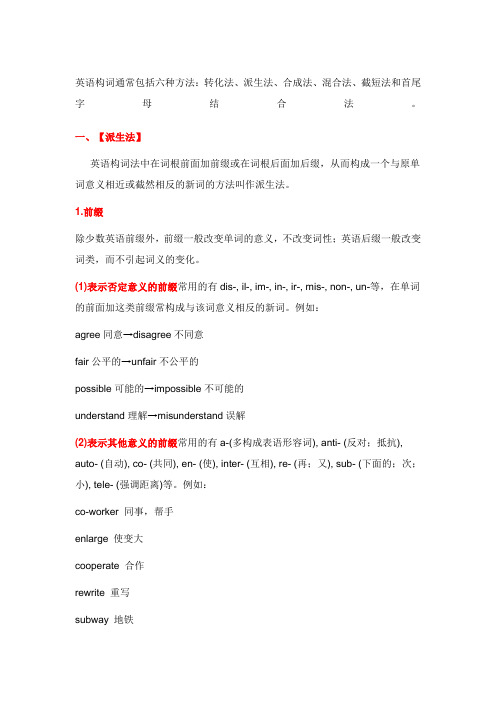
英语构词通常包括六种方法:转化法、派生法、合成法、混合法、截短法和首尾字母结合法。
一、【派生法】英语构词法中在词根前面加前缀或在词根后面加后缀,从而构成一个与原单词意义相近或截然相反的新词的方法叫作派生法。
1.前缀除少数英语前缀外,前缀一般改变单词的意义,不改变词性;英语后缀一般改变词类,而不引起词义的变化。
(1)表示否定意义的前缀常用的有dis-, il-, im-, in-, ir-, mis-, non-, un-等,在单词的前面加这类前缀常构成与该词意义相反的新词。
例如:agree同意→disagree不同意fair公平的→unfair不公平的possible可能的→impossible不可能的understand理解→misunderstand误解(2)表示其他意义的前缀常用的有a-(多构成表语形容词), anti- (反对;抵抗), auto- (自动), co- (共同), en- (使), inter- (互相), re- (再;又), sub- (下面的;次;小), tele- (强调距离)等。
例如:co-worker 同事,帮手enlarge 使变大cooperate 合作rewrite 重写subway 地铁2.后缀给单词加后缀也是英语构词的一种重要方法。
后缀通常会改变单词的词性,构成意义相近的其他词性;少数后缀还会改变词义,变为与原来词义相反的新词。
下面仅作简单介绍。
(1)构成名词的后缀常用的有-ence,-(e)r/ -or (从事某事的人),-ese (某地人),-ess (雌性),-ian (精通……的人),-ist (专业人员),-ment (性质;状态),-ness (性质;状态),-tion(动作;过程)等。
例如:differ不同于→difference区别write写→writer作家China中国→Chinese中国人act表演→actress女演员music音乐→musician音乐家(2)构成动词的后缀常用的有-(e)n (多用于形容词之后),-fy (使……化),-ize (使……成为)。
英语8种构词法总结

英语8种构词法总结派生法(在词根的前面或后面加上某个词缀)、合成法(由两个或两个以上的词合成一个新词)、转换法(在词形不变的情况下,一个单词由一种词性转换成另一种词性)。
构词法主要有三种:派生法、合成法和转换法。
一、派生法在一个词的词根(root)的前面或后面加上某个词缀来产生新词,这种构词法称为派生法(derivation)。
加在前面的词缀叫前缀(prefix),加在后面的词缀叫后缀(suffix)。
(一)后缀:许多名词、形容词、副词和动词是由词根加后缀构成的。
1.构成名词的常用后缀有:(1)-er,-or,-ist,-ee,-ese,-ant等用于构成表示人或物的名称。
例如:thinker(思想家),guesser(猜想者),translator(翻译者),conductor(导体);physicist(物理学家),dentist (牙科医生);employee(雇员),trainee (受训人员);physician(内科医生),Italian (意大利人);Japanese(日本人); assistant(助手)等。
(2) -ance, -ence, -(a)tion, -sion, -ics, -ing, -ity, -ment, -ness, -th, -ty,-ure,-ship等用于构成表示行为、性质、状态等抽象名词。
例如:acceptance(接受),assistance (帮助); dependence(依靠),confidence(信心);repetition (重复),preparation(准备); discussion(讨论),division (分开);physics (物理学),fabrics (纺织品); building (建筑物),wedding (婚礼);reality (现实),ability (能力); settlement(解决),argument (争论);greatness (伟大),hardness (硬度); warmth (温暖),length (长度);safety (安全),penalty (惩罚); failure (失败),pressure (压力);friendship(友谊),leadership(领导)等。
- 1、下载文档前请自行甄别文档内容的完整性,平台不提供额外的编辑、内容补充、找答案等附加服务。
- 2、"仅部分预览"的文档,不可在线预览部分如存在完整性等问题,可反馈申请退款(可完整预览的文档不适用该条件!)。
- 3、如文档侵犯您的权益,请联系客服反馈,我们会尽快为您处理(人工客服工作时间:9:00-18:30)。
高中英语构词法讲解与练习一.类别英语构词法主要有:合成法,转化法,派生法,混成法,截短法和词首字母缩略法。
二.定义与精讲1.转化法英语中,有的名词可作动词,有的形容词可作副词或动词,这种把一种词性用作另一种词性而词形不变的方法叫作转化法。
1)动词转化为名词①很多动词可以转化为名词,大多数情况下,意思没有多大的变化,如:Let's go out for a walk.我们到外面去散散步吧。
②有时意思有一定变化,如:He is a man of strong build.他是一个体格健壮的汉子。
③有的与一个动词和不定冠词构成短语,表示一个动作:如Let's have a swim.咱们游泳吧。
2)名词转化为动词①很多表示物件,如Did you book a seat on the plane? 你订好飞机座位了吗?②身体部位,如:Please hand me the book.请把那本书递给我。
③某类人的名词可以用作动词来表示动作,如:She nursed her husband back to health.她看护丈夫,使他恢复了健康。
④某些抽象名词也可作动词。
如:We lunched together.我们在一起吃了午餐。
3)形容词转化为动词有少数形容词可以转化为动词。
如:We will try our best to better our living conditions.我们要尽力改善我们的生活状况。
4)副词转化为动词有少数副词可以转化为动词。
例如:Murder will out.(谚语)恶事终必将败露。
5)形容词转化为名词①表示颜色的形容词常可转化为名词,如:You should be dressed in black at the funeral.你在葬礼中该穿黑色衣服②某些形容词如old, young, poor, rich, wounded, injured等与the连用,表示一类人,作主语时,谓语用复数如下,如:The old in our village are living a happy life.我们村的老年人过着幸福的生活。
2.派生法在词根前面加前缀或在词根后面加后缀构成一个与原单词意义相近或截然相反的新词叫作派生法。
1)前缀除少数前缀外,前缀一般改变单词的意义,不改变词性;后缀一般改变词类,而不引起词义的变化。
(1)表示否定意义的前缀常用的有dis-, il-, im-, in-, ir-, mis-, non-, un-等,在单词的前面加这类前缀常构成与该词意义相反的新词。
例如:appear出现→disappear消失ncorrect正确的→incorrect不正确的lead带领→mislead领错stop停下→non-stop不停(2)表示其他意义的前缀常用的有a-(多构成表语形容词), anti- (反对;抵抗), auto- (自动), co- (共同),en- (使), inter- (互相), re- (再;又), sub- (下面的;次;小), tele- (强调距离)等。
例如:alone单独的antigas防毒气的autochart自动图表cooperate合作enjoy使高兴internet互联网reuse再用subway地铁telephone电话2)后缀英语单词不仅可以通过加前缀构成新词,也可加后缀构成新词。
后缀通常会改变单词的词性,构成意义相近的其他词性;少数后缀还会改变词义,变为与原来词义相反的新词。
(1)构成名词的后缀常用的有-ence,-(e)r/ -or (从事某事的人),-ese (某地人),-ess (雌性),-ful (一……),-ian (精通……的人),-ist (专业人员),-ment (性质;状态),-ness (性质;状态),-tion(动作;过程)等。
例如:differ不同于→difference区别write写→writer作家Japan日本→Japanese日本人act表演→actress女演员mouth口→mouthful一口music音乐→musician音乐家(2)构成动词的后缀常用的有-(e)n (多用于形容词之后),-fy (使……化),-ize (使……成为)。
例如:wide→widen加宽beauty→beautify美化pure→purify提real→realize意识到organ→organize组织(3)构成形容词的后缀常用的有-al,-able (有能力的),-(a)n(某国人的),-en (多用于表示材料的名词后),-ern (方向的),-ese(某国人的),-ful,-(ic)al,-ish,-ive,-less (表示否定),-like (像……的),-ly,-ous,-some,-y (表示天气)等。
例如:nature自然→natural自然的reason道理→reasonable有道理的America美国→American美国的China中国→Chinese中国人的gold金子→golden金的east东→eastern东方的child孩子→childish孩子气的snow雪→snowy雪的(4)构成副词的常用后缀有-ly (主要用于形容词之后表示方式或程度),-ward(s) (主要用于表示方位的词之后表示方向)。
例如:angry生气的→angrily生气地to到→towards,向…east东方→eastward向东(5)构成数词的后缀有-teen (十几),-ty (几十),-th (构成序数词)。
例如:six六→sixteen十六→sixteenth第十六four四→forty四十→fortieth第四十4.截短法(缩略法) 截短法,即将单词缩写,词义和词性保持不变,主要有截头、去尾、截头去尾等形式。
1)截头telephone→phone aeroplane→plan omnibus→bus2)去尾mathematics→maths co-operate→co-op examination→exam kilogram→kilo laboratory→labtaxicab→taxi 3)截头去尾influenza→flu refrigerator→fridge prescription→script5.混合法(混成法)混合法,即将两个词混合或各取一部分紧缩而成一个新词。
后半部分表示主体;前半部分表示属性。
news broadcast→newscast新闻广播television broadcast→telecast电视播送smoke and fog→smog烟雾helicopter airport→heliport直升飞机场6.首尾字母缩略法首尾字母缩略法,即用单词首尾字母组成一个新词。
读音主要有两种形式,即各字母分别读音;作为一个单词读音。
very important person→VIP (读字母音)要人;大人物television→TV (读字母音)电视三.巩固练习1. That man was ________enough not to tell the manager that he would not do the job.A. careB. carefulC. carelessD. carelessness2. The soldier died for saving the child,so his________ is heavier than Mount Tai.A. dieB. deadC. diedD. death3. The child looked ________at his brother who was badly wounded.A. sadlyB. sadnessC. sadlyD. sad4. He is an expert at chemistry. We all call him a ____.A. chemistryB. chemicalC. chemistD. physician5.The three- ________chair isn’t suitable for a young child. He may fall off.A. leggingB. leggedC.legsD. leged6. Stephenson became the________railway engineer in the world.A. leadB. leaderC. leadingD. leadership7.When the teacher praised him for working out the maths problem,Jack looked______about at hisclassmates.A. proudB. proudlyC. prideD. pridely8.To everyone’s ___,the girl finished the job quite well.A. satisfiedB.satisfactoryC. satisfyingD.satisfaction9.—What are you doing here?—Oh,my teacher asked me to write a passage about ________in English.—You can write________passage in English?A. 600 words;a 600-wordsB. 600-word;a 600-wordsC. 600 words;a 600-wordD. 600 words;a 600-words10. No one should enter the spot without the________of the police.A. permitB. permissionC. permittingD. permittence11. You must come with us to the police ____.Our head is waiting for you.A. headquartersB. headlineC. headmasterD. headache12.Letting that animal escape was no accident;you did it _____.A. intendB.intentionC.intentionallyD. intentional13.The shop owner welcomed all the guests with a___smile.A. practiceB. practiseC. practicalD. practiced14. The________ordered him to pay a $100 fine.A. judgerB. judgmentC. judgeD. judgement15. My TV is out of order. Can you tell me what is the________news about Iraq War?A. latelyB. latestC. laterD. latter16. The Great Wall is more than 6000 li in ________.A. longerB. lengthC. longD. longing17.To my ________,I passed the exam easily.A. joyB. joyfulC. joylessD. joyness18. Canada is mainly an________country.A. English-speakingB. speak-EnglishC. spoken-EnglishD. English-spoken19. How________ he is! He is always acting________.He is really a ________.A. foolish;foolishly;foolB. fool;foolish;foolC. foolish;fool;foolD. foolishly;foolish;fool20. The necklace that she lost is very expensive. It’s of great ________.A. valuableB. valueC. valuelessD. unvaluable21. There were________fish in the river in South America.A. in dangerB. dangerC. dangerousD. dangerless22.The letter “b”in the word “doubt”is________.A. soundB. silentC. silenceD. sounded23. The child looked at me________.A. strangerB. strangelyC. strangeD. strangeless24.The black people were against slavery and fought for their________bravely.A. freeB. freelyC. freedomD. frees25. What you said sounded________ but in fact it was untrue.A. reasonableB. reasonfulC. reasonlessD. unreason26. We have to learn ________technology from other countries.A. advanceB. advancingC. advantageD. advanced27. The children live in a village ________.They come here almost every day.A. nearbyB. nearC. nearlyD. near by28.Mr Black is an ________in the army,not an ________in the government. You can not easily find him in his________.A. official;officer;officeB. officer;office;officialC. official;official;officialD. officer;official;office29.You’d better give up smoking if you want to keep ________.A. healthB. healthyC. healthilyD. healthier30.________ speaking,I didn’t do it on purpose.A. HonestlyB. HonestC. HonestyD. Dishonest[参考答案]1-5 BDACB 6-10 CBDCB 11-15 ACDCB 16-20 BAAAB 21-25 CBBCA 26-30 DADBA。
